A constitution organizes people into a team
A nation's constitution is
a set of
instructions that people follow in order to become a united team. The instructions set up a
leadership hierarchy (a government), and provide the people with rules
to follow.
The constitution of a nation is
similar to the set of instructions that all other organizations use. For
two examples:
• A zoo.
The set of documents that
we use to create and operate a zoo
could be described as "the zoo's
constitution".
As illustrated in the image below, those documents have diagrams to
show the size and location of the exhibits, set up a leadership
hierarchy to organize the employees into a team, and provide the
employees with instructions on the time of day to feed each animal, the
type of foods to provide each animal, and how to maintain and repair
the facilities.

• A factory.
The set of documents that Boeing
uses to build and operate a factory could be described as "the constitution of the factory".
Those documents provide diagrams of the factory, specify the equipment
that the factory needs, set up a leadership hierarchy to organize the
employees into a team, and provide the employees with instructions on
how to use the equipment to build and test an airplane.
All constitutions are sets of
instructions that
a group of people follow. All constitutions could be described as
"software programs for the human mind". The only significant difference
between the constitutions of a nation, factory, and zoo is their purpose. One of them organizes
people into a nation, another
organizes people into a team to create
material items, and another organizes people into a team to maintain exhibits of animals.
All organizations
have a constitution
If a group of people are not organized into a hierarchy, or
if they are not
following the same set of rules, then they are independent people, not
a united team. They are analogous to an unorganized group of cats that
do whatever they please.
In order for people to form an organization, they need a leadership
hierarchy, and they need rules to follow. That hierarchy and those
rules could be described as the "constitution of the organization".

A group of people become an
organization only when they have a hierarchy and rules. Therefore,
every organization, including a family,
could be described as having a constitution. However, families and
small
organizations rarely create written
constitutions.
As with prehistoric
tribes, the families and small organizations have such a simplistic
hierarchy and such informal rules that they rarely bother
describing any of it in documents.
There are only a few families who have bothered to write some of the
rules on chalkboard or sheets of paper, as in the photo to the right.
The instructions in that photo could be described as "a portion of the
family's constitution."
There is no correct form for a constitution
A constitution is nothing
more than an intangible set of
instructions for the minds
of a group of people. There is no correct form for those instructions. For
example, the instructions can be written with a feather on sheets of
sheepskin
parchment, or they can be in the form of PDF or HTML documents that
remain on a computer. Primitive tribes and families pass the
instructions to one another with their voice.
Government officials
should want to analyze
other constitutions
The constituteproject.org
site
has a list of every nation's constitution. The majority of people have
no need to look at this site, but government officials should want
to look at it so that they can learn
from other nations.
It might help you to understand this concept if you consider how it
applies to material items. Imagine if every nation had the
economic system that I propose in which businesses cannot keep their
technology a secret, or copyright or patent anything. In that type of
economy, the engineering diagrams for all material items, and the
source code for all computer software, would be freely available to
everybody.
With that type of economic system, an engineer who wants to design a
better refrigerator would be able to
look through the diagrams of other refrigerators, and that would allow
him to learn from the other
engineers. He would be able to take the good aspects of the other
refrigerators, avoid the mistakes that the other engineers have made,
and build upon their work to
create a better refrigerator.
If there was a site that held all of the diagrams for all of the
refrigerators of the world, we would notice that there are only a few
subtle differences between the refrigerators made by Samsung,
Westinghouse, and other companies around the world. The reason is
because most scientists and engineers are already in the
habit of looking at one another's achievements and failures, and trying
to learn from one another.
As a result of this attitude, when a business develops some new
technology that turns out to be beneficial, the engineers in other
businesses, and in other nations, will soon learn about the
achievement, and they will use that information to improve their own
products. The engineers built upon the work of one another.
The aspect of this behavior that I want you to be aware of is that by
learning from one another, the scientists and engineers " equalize"
the technology of all businesses and nations. To rephrase this, it is
impossible for one business or one nation to develop significantly more
advanced refrigerators, cell phones, or robots when the other
businesses and nations are learning
from each other.
This allows even the most primitive nations to have modern
refrigerators, cell phones, and bicycles. Unfortunately, it also
allows them to have modern weapons.
A good way to understand the significance of this is to imagine what
the world would be like if the engineers refused to learn from one
another. In such a case, the engineers who design refrigerators for
General Electric would never look at the refrigerators produced by RCA,
Samsung, or other businesses. This would cause the refrigerators of
different businesses and nations to slowly diverge from one another,
like animals evolving into different species.
By comparison, when the engineers learn from one another, they produce
refrigerators that are always somewhat equal
to one another. The refrigerators "evolve" through the years, but they
don't diverge into different,
incompatible "species".
The situation with culture is the opposite. There are no government
officials who analyze the culture of other societies in order to learn
from them. No government is even interested in experimenting with
improvements to their culture. Instead, every society promotes the
attitude that their culture is perfect, and they ignore or insult other
cultures.
Our primitive attitude towards culture is causing "cultural isolation".
This is preventing us from improving our culture, and learning from
other
people. The Asians, for example, will not look seriously at the
European culture, or look critically at their own culture. They refuse
to consider the possibility that knives and spoons are
superior to chopsticks, or that the European languages are superior to
the Asian languages.
By ignoring the achievements of other societies, our culture has
diverged into different "species". We have significantly different
languages,
religions, clothing styles, holiday celebrations, eating utensils, and
government systems.
By comparison, most of our sports activities have become identical
to one another. For example, football, baseball, gymnastics,
and many other sports are almost the same in most nations. The
reason is because businesses are trying to profit from sports, so they
put pressure on all nations to follow the same set of sports
instructions.
If businesses could make profit by having all nations speak a common language,
then they would put pressure on everybody to learn a common language.
Unfortunately, businesses make more profit when people speak different
languages, such as by providing translation services.
The English language dominated the software and Internet
documents in the 1980s, so that would have been a good opportunity to
pressure all nations to start teaching English to their
children. If all nations had begun teaching English to their children
during the
1980s or 1990s, the world today would have a generation of young adults
who could communicate with one another. And if the American children
had been forced to learn the metric system at that same time, then all
of the
young adults today would use the same measurement system, also.
Unfortunately, instead of pushing one language on everybody, the
computer programmers were told to translate their
software, and to allow the HTML documents to support non-alphabetic
languages. The computer programmers were pushed into using Unicode
in order to support the primitive Asian languages, rather than telling
the Asian nations to switch to an alphabetic language. And the
Americans were allowed to continue using the
Imperial measurement system.
We should learn from other nations, not
ignore them
If government leaders had
the attitude of engineers, then
instead of boasting that their culture is the best, they
would try to learn from other nations. That attitude would cause
every nation to slowly find improvements to their school system, work
environment, city design, flood control system,
and other culture. It would also cause every nation's culture to become
more similar to one
another because everybody would be taking the good aspects of other
people's culture.
Some people are willing to learn from the food recipes
of other
cultures, but we tend to ignore or insult most other aspects of other
people's culture. As a result of our cultural isolation, the
cultural differences between nations are much greater than the
differences in our refrigerators, bicycles, and cell phones.
If you had to purchase culture, what would you choose?
Another way to look at
culture that might be helpful is to imagine what we would do if we had
to purchase culture from businesses rather than pick it up during our
childhood. In such a case, the markets would sell such things as
languages, sports activities, clothing styles, and hairstyles.
The Chinese language would be so complicated that it would have a much
higher price tag than the English language, and it would have an
instruction manual that was gigantic by comparison. Furthermore, if you
selected the Chinese language, you would have to ensure that all of the
products you want to purchase used the Chinese language also, such as a
computer, cell phone, and software.
Would you choose the Chinese language for yourself or your children?
Even if all languages were the same price, who would want to impose the
burden of learning that language on themselves or their children?
Businesses are under pressure to produce products that are easy to use
and understand, and at a low price. If the businesses were providing us
with languages, they would be under pressure to create a language that
is low in price, and very easy to use and understand. Only a few
hobbyists would want to purchase Egyptian hieroglyphics, or one of the
Asian languages.
By comparison, nobody cares whether their culture is efficient,
orderly, or even useful. Nobody cares how worthless their government
system is, or how expensive or worthless their school system is. They
don't even care if they are wearing shoes that are deforming their feet
and causing unnecessary sores, bunions, and crooked toes. There is no
pressure on any society to analyze their culture and look for
improvements to it.
Government systems
have not improved much
The list of constitutions
makes it easy to see that some nations have a
government system that is extremely
primitive. For
example, the constitution of Denmark was written in
1953, but it appears to have been written during the
Middle Ages. For example, it has such remarks
as:
• The form of government
shall be that of a constitutional monarchy.
• The King shall not be answerable for his actions; his person shall be
sacrosanct.
• The Evangelical Lutheran Church shall be the Established Church of
Denmark.
Incidentally, you might find it entertaining to imagine how the
millions of American citizens who are furious at President Trump would
react if the U.S. Constitution stated:
The president shall not be answerable to his actions;
his person shall be sacrosanct.
Or imagine if a business announced that the top executive was sacrosanct,
or if a police department announced that the policemen shall not be answerable for
their
actions.
Imagine if the material items in
Denmark were as primitive as their government. For example, consider
that imaginary scenario I mentioned earlier in which there is a site
that has all of the engineering diagrams for all material items.
Imagine looking at the
entry for Denmark and discovering they don't have
diagrams for refrigerators, airplanes, or other modern items. Instead,
they have diagrams that were created during the Middle Ages or
earlier. Imagine that the engineering diagram for the wheelbarrel they
use in 2020 was created in the year 964, and it creates the type of
wheelbarrel that is shown in the painting below.
|
 |
|
 |
What is the difference
between:
a) People in 2020 using wheelbarrows
from the Middle Ages.
b) People in 2020 using a government
system from the Middle Ages.
The difference is that everybody would refuse
to use a primitive
wheelbarrow, but most people proudly boast
about using a primitive government
system. And they also boast about using primitive chopsticks, primitive
religions, primitive languages, and other primitive culture.
The Danish people should be embarrassed
of their crude and stupid
Constitution, but most people are either too ignorant to realize that
they should
look critically at their culture, and/or they don't have enough
self-control to be critical of their culture. As a result, we are
usually only critical of other
people's culture.
The U.S. Constitution
is more advanced than most
I
have frequently criticized the U.S. Constitution as being vague and
confusing, but my criticisms are not to imply that other nations are
superior. Rather, I am an American, and I would like to see the nation
improve itself, and so I provide what I consider to be "constructive
criticism", and suggestions for improvement.
Compared to other nations, I actually think the U.S. Constitution is superior.
For example, I would describe the constitution of Denmark as being so stupid that it should be discarded and rewritten.

The United Kingdom never
created a constitution. Instead they have been collecting
various laws and regulations from the Magna Carta onward. It reminds me
of how homeless people gather clothing, shopping carts, discarded food,
and other items ( such as the woman in the photo to the right).
The Swiss constitution was written
in 1999, which was a few decades after the Danish constitution, and it
was revised in 2014. That would make it a "modern" constitution, but I
would not describe it as an
improvement over the Danish constitution, or the U.S. Constitution.
I have repeatedly criticized the U.S. Constitution for lacking detail,
thereby creating endless arguments over the meaning of many of its
remarks, but the Swiss constitution is not
an
improvement, even though it was written centuries later.
To be fair to the Swiss constitution,
I don't speak the language it was written in, so the English
translation could be slightly inaccurate, but
take a look at Article 7, which is one brief sentence:
Human
dignity must be respected and protected.
What does that mean? There is no
explanation. If
you were a government official, or a policeman, and you were told that
your job is to "ensure that
human dignity is respected and protected", how would you enforce
that law? What
does a person have to do to violate that law?
Or
imagine that you were arrested
because somebody accused you of
violating Article 7. How would you
prove that you were innocent of that "crime"?
The Swiss constitution has the type of vague remarks that I expect in a
political advertisement,
and for the purpose of making us feel
good. Those remarks do not
belong in a
serious document that is providing us with instructions on how to set
up and operate a modern society.
There has been a tremendous
amount of technical progress during the past thousand years, but our
constitutions, governments, schools, economic systems, and other
culture has not improved much.
A constitution is
instructions for a human zoo
A constitution is analogous
to the set of instructions that explain how to
create and operate a zoo for animals. Imagine that you are an employee
of a zoo,
and you find this remark among the instructions on how to take care of
the animals:
Animal dignity must be respected and
protected.
What is animal dignity? How do we protect it? Do animals even have
dignity? If not, when during the history of the development of humans
did our ancestors develop dignity? Is dignity a
genetic characteristic, or something we pick up from our environment?
Do all people have it equally? Do children have it? If not, at what age
does a person acquire it?
Today we have so much knowledge about animals
that a scientist can provide zoo employees with a very detailed list of
instructions on how to take care of animals. By comparison, the
documents that we create to supervise a human society are vague,
stupid, and
confusing.
The IBM constitution
does not resemble a legal
document
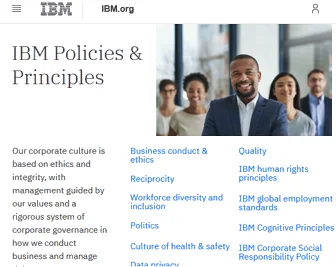
|
| A
portion of the IBM "Constitution" |
IBM posted this document
that could be described as "the IBM constitution", and this
section
about "global employment standards" has a resemblance to the Bill of
Rights in the U.S. Constitution.
The IBM
Constitution is an example of how a constitution can be in any format
we please. The IBM
Constitution does not resemble any nation's constitution, or any legal
document.
Rather, it resembles the documents that businesses create for their
employees and customers.
For example, it uses "ordinary" words that are commonly used by the
majority of people, and the sentences are also ordinary, rather than as
lawyers often create them; namely, extremely long, with lots of
semicolons.
Furthermore, it is an HTML document
with a photo and links to other documents, just like lots of other
"ordinary" documents on the Internet. And, as is typical of HTML
documents, as of 15 Nov 2020, at least one of the links did not work.
( The link to their "nine IBM practices" in the Quality
section.)
The authors wrote that document in a manner that would allow the
"ordinary" employees to understand the rules of IBM, and to ensure that
every employee interprets the rules in exactly the same manner.
This brings me to an important concept that I will emphasize in this
document. Specifically, the most important aspect of
our
Constitution is that people understand
it and agree on its meaning.
Our sports organizations are more
advanced than our governments
Every organization needs
some type of leadership hierarchy, and they
need rules for their members to follow. This is true regardless of
whether the organization is a business
that manufactures a product, or whether they are a nation, or whether they are an orchestra.
Every
organization
can be considered to have a constitution, but the constitutions of most
organizations are so much more advanced that they
don't resemble the constitution of a nation. An example is the
constitution created by the sports organization that arranges for
bicycle races in the USA. Its name is USA Cycling.
The sports organizations are providing us with entertainment, so they are not
vital for our survival, as are the organizations that provide us with
food and other necessities. Furthermore, some of the sports
organizations are so small that only a tiny percentage of the
population is aware of or involved with them, which makes them insignificant to
the nation.
The USA Cycling group is such a small organization, and has so little
significance to our nation, that they could disappear tomorrow without
many people noticing or caring. However, despite their
insignificance, they have a
rulebook that is more extensive,
advanced, and detailed than every
nation's constitution.
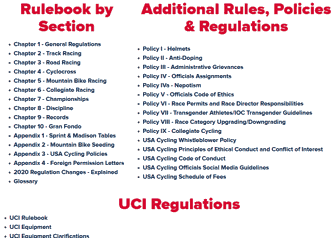
|
| A
portion of the USA
Cycling "Constitution" |
This
site has
the rules that the athletes and judges must follow. They provide the
rules in the form of a PDF file. It has 10 chapters, appendices, a
glossary, and an index, for a total of 210 pages. It is mostly words,
but there are some diagrams.
They also have links to 3
additional documents of "UCI Regulations".
In addition, they have links to 15
more documents that they refer to as "Additional Rules, Policies
& Regulations".
One of those 15 additional documents has the title " Nepotism".
The athletes and judges who are involved with bicycle racing have a set
of rules that is much easier to read and understand, and has a lot more
detail, than what the U.S. Constitution provides the American people.
Furthermore, the USA Cycling group has created rules to deal with
problems that the
U.S. Constitution doesn't even acknowledge, such as nepotism.
Even more important, the USA Cycling group has this
document about
" Conflicts Of
Interest". By comparison, the U.S. Constitution doesn't
care about conflicts of interest. For example, as I pointed out here,
government employees should not
be allowed to vote because
they have a conflict of interest
in the election.
A more complex conflict of interest that the U.S. Constitution does not
acknowledge is that there are a lot of Jews in the USA who are members
of a Zionist organization, and who have relatives in Israel, and who
have dual citizenship with Israel. We could describe them as having a
conflict of interest, and that they should be prohibited from
influential positions, such as government officials, journalists, and
FBI officials.
The USA Cycling group has a more
advanced and detailed
set of rules than the U.S. Constitution. This ought to be considered an
embarrassment
because our government should
be more advanced than a meaningless
entertainment activity.
I have not bothered to look at the rules for the sport of " competitive eating",
but I suspect that it also has a more advanced set of rules than any
nation.
I doubt that they have a rule that states something like:
The
winner of the Nathan's annual Hot Dog Eating Contest shall not be
answerable for his actions; his person shall be sacrosanct.
Teams that produce cartoons have constitutions more
advanced than a nation

|
| Two
pages of The Simpson's "Constitution" |
Josh Weinstein, who was
involved with producing The Simpsons television program, posted
images of two pages of the "Style Guide" that was created around 1990.
The "Simpsons Style Guide" could be described as " the constitution
of the Simpsons television program" because it is similar to a
nation's constitution.
Specifically, it is a set of
instructions
that a group of people follow in order to become a united team. The
instructions tell the people how to draw the characters, which colors
to use, what is prohibited, etc.
On some of the pages, they refer to the instructions as " Simpson No-No's",
but it doesn't matter whether we refer to an instruction as a "No-No",
law, or rule. Regardless of what we call it, it is an intangible
instruction that a group of people must follow in order to control
their behavior. It is a restriction
of their freedom. Its purpose is to convert a group of
independent people into a united team with a common goal.
The only important difference between The Simpsons Style Guide and the
US Constitution is the purpose
of the instructions. Specifically, one set causes a group of people to
produce a cartoon program with multiple episodes, and the other set
causes the people to form a nation.
The Simpsons cartoon is entertainment, not
something important. However, its style guide has nearly 500
pages, which makes it more detailed
than any nation's constitution.
What would you think if the Simpson No-No's were so vague and confusing
that the artists were routinely
arguing with each other over what they meant? And what would
you think if the managers ignored the
arguments and allowed the artists to interpret the No-No's in a
different manners?
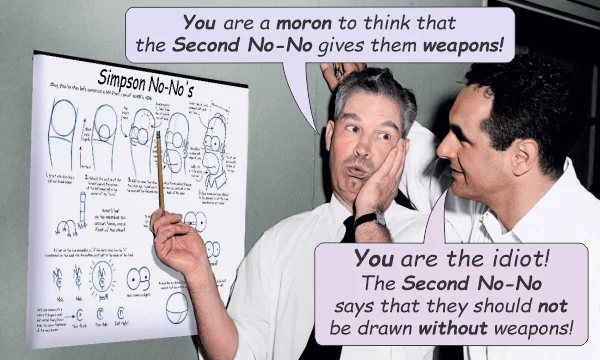
Most organizations try to improve their constitution
The documents created by
USA Cycling
could be described as their "constitution" because they set up a
leadership hierarchy and provide rules for the members to follow. It
should be noted that when the USA Cycling was first created, they had a
slightly different set of rules. They have edited their original documents.
As with most other
organizations, they try to improve
their constitution, rather than
stand on a pedestal, wave flags, and boast that they have created the
greatest set of rules. They did not
put their original constitution in a display case and promote it
as the ultimate set of rules for bicycle races.
Instead, they have continuously looked for ways to improve their
organization, the contests, and the rules.
The people involved with the USA Cycling group do not have the
attitude towards their organization that citizens have towards their
nation. For two examples:
• When the athletes,
judges, or other people are confused about a rule, they are willing to edit the rule to improve its clarity
rather than demand that the organization
"return to their original constitution".
• If somebody suggests improvements to their contests, rules, or
organization, or if somebody provides some constructive criticism, the
people do not react
with hatred, anger, or sarcasm. They do not yell, "If you don't like the organization,
then get out!"
Instead, they react to constructive criticism by considering whether
the person has a valid complaint, and if so, they will improve their
organization by editing their
documents.
The IBM constitution also shows this superior
attitude. For
example, it has several remarks scattered around it
that are similar to this:
| In effect since August 15, 1995;
replaces earlier policy dated November 10, 1986. |
There are no remarks like that in
the U.S. Constitution, and probably not in any other nation's
constitution. That remark shows that the people at IBM are willing to update and replace
portions of their constitution. This is equivalent to updating and replacing the second amendment
of the American constitution with a more detailed and modern
policy.
The people who created the IBM constitution realize that it is just set of instructions
that is intended to accomplish a task; specifically, to organize a
group of people into a team. The IBM managers do not regard
the words in their constitution as "precious". As a result, they are
willing to edit those words in
order to improve the clarity of the instructions. They are also willing
to update their constitution
so that it can deal with changes in technology and culture. They are
willing to discard portions of
their constitution and replace them with
a new and improved version.
A person is able to
suggest a change to the IBM constitution without fear of being insulted
as a
"traitor to IBM", or a "radical extremist".
The IFAB has an
advanced constitution
The International Football
Association
Board (IFAB) created a constitution to organize and supervise football
games. As
with the USA Cycling group, they are a sports organization of no importance
to the human race, but they have a much more advanced constitution than
any nation, and their constitution shows an attitude that is far
superior to what we find in our government officials.
Their constitution has a lot of photos, diagrams, and videos to
help explain the concepts that the words represent. It should be noted
that some of their photos are "unnecessary"
because they don't actually clarify anything in the document, but the
human mind prefers to look at photos or diagrams rather than
words. Therefore, we can make large blocks of text more pleasant by
scattering photos throughout the document.
They designed their constitution so that we want to read it, and so that we can
understand it
easily. It is not intended to
be used only by some lawyers.
It should also be noted that they created this HTML document ( a
portion is below) to provide a
history of their laws.

The leaders of the IFAB are
aware that they must improve
and update
their laws once in a while, and they have documented the history of
the changes to help people understand how the sport evolved into what
it is today.
The document of their history shows an
attitude that we don't see among most government officials.
Specifically, they are
willing to rewrite their entire
constitution. The entry for 2016 has this remark:
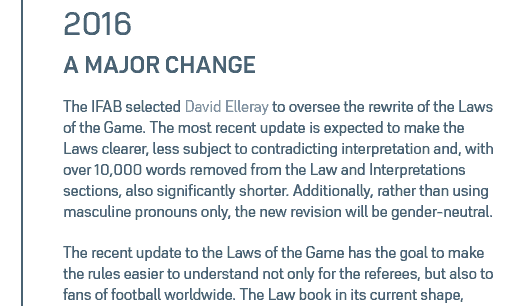
What they refer to
as the "Laws of the Game" could be described as their "Constitution".
The difference between their "Laws of the Game" and a
nation's Constitution is the purpose
of the instructions. Specifically, the IFAB organizes people for just
one, particular sports activity, whereas a nation's constitution
organizes people into a nation.
The IFAB realizes that the words in their "Laws of the Game" are not precious, and do not need to be protected. Therefore,
they are willing to edit the
words, and discard thousands
of words, in order to make those concepts less confusing, make the laws
easier to read, and make
the laws "less subject to contradicting interpretation".
If we had government officials with that attitude, they would be
willing to discard the entire
constitution and rewrite it
to make it less confusing and easier to read.
Our nations should
learn from the IFAB
Our government officials
should have the attitude that we see among the leaders of the IFAB. For
example, their introduction
has such remarks as:
• For
a Law to be changed, The IFAB must be convinced that the change will
benefit the game. This means that the potential change will usually be
tested.
• The Laws must help make the game
attractive and enjoyable <...>.
•
The aim was to make the Laws clearer, more accessible and to ensure
they reflect the needs of the modern game at all levels.
|
Those remarks show that the
leaders of the IFAB:
1) Are listening to suggestions for
improvements to their constitution.
2) Realize that they must experiment
with most of the proposed changes rather than be arrogant jerks who
believe that they are such all-knowing, super geniuses that they can
figure out what will truly be an improvement.
3) Want to improve the clarity of the laws so that there is less confusion about what they mean.
4) Want to make the game more
enjoyable.
5) Want to update the game to
deal with changes in technology and culture.
Imagine if we had government officials with that attitude. In such a
case, we would have officials who consider
our suggestions on how to
improve our nation, and who have the courage to experiment with potential
improvements.
Nobody should be afraid of being fired, arrested, or insulted for
pointing out problems with a constitution, any aspect of our culture,
or for suggesting changes to our culture. The people who find ways to
improve the clarity of a law, or who find ways of improving government
agencies, school systems, museums, recreational
activities, wedding ceremonies, or social affairs, should be regarded
as creative, talented, and valuable.
A constitution
should be designed for society,
not to appease us
Although most organizations
have constitutions that are much more advanced than those
of the nations, organizations are not
designing their constitutions
properly. The reason is because a free enterprise system causes the
organizations to compete for the attention of the public and investors.
As a result,
the organizations want their constitutions to impress potential investors and
customers.
The free enterprise system causes businesses, charities, and other
groups to pander to the
public, which in turn causes their constitutions to resemble political advertisements.
Specifically, instead of being as serious as they should be, they tend
to create lots of boastful remarks; make
promises of how wonderful our lives will be as a result of their
products or services; and have lots of photos of customers and
employees who are smiling to an unrealistic extreme.
|
In
the USA, organizations frequently create unrealistic mixtures of
races, sexes, and ages, just like the political advertisements.
How extreme would the smiling, promises, and mixture of people have to
be
before the public realized that the organizations are trying to manipulate us?
|
|
 |
The sports organizations also pander to
us, and stimulate us with praise. For example, the IFAB has this "Introduction" to
football, and the first sentence is:
Football is the
greatest sport on earth.
That remark should be considered as deceptive, manipulative, worthless,
and unacceptable as when a political candidate announces to an audience:
The United States is the greatest country
on earth!
The American people are
the greatest people in the world!
The IFAB leaders also pander to feminists, which is why they wrote:
Additionally,
rather than using masculine pronouns only, the new revision will be
gender-neutral.
Ideally, our leaders would realize that every language has been
developing haphazardly. No society has yet bothered to take
control of their language and make it orderly. It is senseless for a
few people to make a few changes to our language simply to appease some
feminists. We should acknowledge that our languages are
just an accumulation of monkey noises.
Our languages need to be overhauled, but that is a very big task,
and it also requires us to alter a lot of existing documents,
spellchecking
software, and speech recognition software. It is a task that the future
generations should deal with, not us.
We have problems that should be considered as a much higher priority, such as:
• Our corrupt and
disgusting governments.
• Our overcrowded, filthy, ugly, and disgusting cities.
• Our primitive economy that is dedicated to profit rather than human
life.
• The extreme amounts of crime, fighting, loneliness, and pouting.
When the future generations have dealt with the serious problems, they
can consider dealing with some of the less important problems, such as
overhauling their language. They might also want to switch to 24 hour
clocks, or change their clock so that there are 100 seconds in an hour,
100 minutes in an hour, and 10 hours in a day. They might even decide
to switch to base 8.
Also, note that the IFAB wrote that one purpose of the editing was to
make the laws " less subject to
contradicting interpretation". That is
another example of how organizations are pandering to people. The IFAB
leadership does not want to admit that they are trying to "reduce
arguments" over the meaning of the laws because the word " arguments"
creates images in our minds of athletes, spectators, and referees yelling and fighting with each other. The IFAB
tries to avoid
stimulating unpleasant memories by using words that are more vague and
confusing. It is analogous to a church official who avoids the word
"pedophile" by saying something like:
"We sent
John Doe to a different church so that the children are less subject to
unexpected contacts of a sensitive nature."
A small percentage of the population is putting a lot of pressure on us
to be "politically correct", but our leaders should make decisions
according to what is best for the
human race, rather than pander to people who whine about
what their particular emotions want. Our laws should be designed to
create a pleasant, efficient organization, not to appease selfish,
whiny, or neurotic people.
Charities tend to
have extremely deceptive
constitutions
The constitutions of the
charities are likely to be much more deceptive
and manipulative than businesses
because the charities depend on donations,
and so their
primary goal is to stimulate us into giving them our money. This
results in them putting
lots of boastful remarks and promises in their constitutions. For
example, the first three paragraphs on the " What We Do"
page of the Save the Children
charity are:
|
How Does Save the Children Help?
In the U.S. and
around the world, Save the Children does whatever it takes — every day
and in times of crisis — to give children a healthy start in life, the
opportunity to learn and protection from harm.
When crisis strikes and children are most vulnerable, we are always
among the first to respond and the last to leave. We ensure children's
unique needs are met and their voices are heard.
|

However, that charity is
not doing " whatever it takes"
to investigate the accusations of pedophilia
among government officials, charities, churches, businesses, pizza
restaurants, or
professors. They also ignore Vicki Polin's
accusations that her relatives are involved with pedophilia and ritual murders of babies.
That charity claims to ensure that the children's voices
are heard, but they are ignoring
the voices of the Hampstead children, Jenny Guskin,
David Shurter, and other
people
who claim to have being repeatedly
raped by government
officials,
teachers, policemen, and other important people.
We should protect
the concepts of a
constitution, not its words
The leadership of the IFAB
and USA Cycling
organizations do not regard their documents as being perfect. As a
result, they are
willing to edit their
documents in order to make their organization more
efficient, the rules more understandable, and their sport more
enjoyable and safe.
By comparison, people treat their nation's constitution as if the words are special
and must be protected. No society is yet promoting the attitude that we
should continuously edit our
constitution to make it more efficient, more understandable, and more
sensible. Instead, people add more
words to their constitution rather
than edit the existing words.
When Americans are accepted into some government agencies, they have to
swear an oath to defend and protect
the U.S. Constitution.
Unfortunately, most people assume that we should protect the words in
U.S. Constitution; that the document
should be protected from editing.
In reality, we should defend the concepts
in the document. The words that an author chooses to express a concept
are
irrelevant. It is acceptable to edit a document in order
to express the concept in a more understandable manner.
Words are important
to fiction
I
suspect that some people are confused about the importance of words
because they realize that words are critical to fictional documents. To
reduce that type of confusion, children should be taught to make a
distinction between fiction and nonfiction, and to treat each in a
significantly different manner.
The fictional documents are entertainment,
so we
could describe them as a type of "art".
Art is intended to stimulate emotions, not convey concepts from one
mind to another.
We have different preferences for art, but it makes no
sense for somebody to claim that he can edit a fictional document to
make it
"better", or "more accurate". Each of us can edit a fictional document
to make it more appealing to our
emotions, but that doesn't necessarily make it more appealing to other
people.
The words chosen by
the authors of fictional documents are very important, and only the
author should be allowed to edit his words. His words are analogous
to the paint in a painting, or the music symbols on a sheet of music.
If we edit artwork, we will not "improve" it. Rather, we create a new and different variation
of it.
We cannot improve art
Artwork
is intended to stimulate emotions, entertain us, or inspire
us to think about something. We "react" to art. We do not try to decode
the concepts that it conveys.
When we look at a painting, vase of flowers, or a sculpture, or when we
listen to music, or when we read a fictional document, it does not
matter if each of us
visualizes something slightly different, or experiences slightly
different emotional feelings. It is acceptable for each person to react to art in a
different manner.

It
is acceptable for different people to experience different emotions or
thoughts when they look at the painting of the Mona Lisa, but it is not
acceptable for people to disagree on the meaning of the First or Second
Amendments, or disagree on the meaning of the laws that set up a
football game or bicycle race.
We can improve the First
Amendment if we can figure out how to edit it so that more people
decode the words in the same manner, thereby reducing the arguments
over what the words represent. However, we cannot improve the Mona Lisa by
editing it.
When a person creates art, regardless of whether it
is a painting, fictional document, vase of flowers, or marble
sculpture, his choice of colors, words, brush strokes, and other
aspects
of the art are what cause it to be "art". It makes no sense to edit art. Each of us has slightly
different preferences in art, but nobody can prove that his preferences
are "better".
By comparison, nonfiction documents, paintings, and 3D models are
intended to convey a concept to our
minds. A nonfiction item could be described as an educational tool.
Therefore, it is important that everybody decode the nonfiction items
into the same concepts. This in turn means that when we discover that
people are disagreeing over the meaning of a nonfiction item, we should
edit it to reduce
the confusion.
A city can pass judgment on art, but not improve it
 It makes no sense to claim that one
piece of art is "better" than
another, but it
is sensible for a society to pass judgment on what type
of art they want to promote.
For example, some people in Australia want the "poop on sticks" art in
their city ( photo
at right),
but some people did not. The city officials decided to allow the
sculpture,
but after a while they decided to modify it by painting it a dark gray
so that the spherical objects, which were originally brown, looked less
like poop.
They did not "improve" the sculpture by painting it. Rather, they
essentially replaced it with a
similar sculpture that has a slightly different emotional effect on us.
The purpose of artwork is to
stimulate emotions or thoughts, rather than convey an intelligent
concept. Therefore, if we edit a sculpture, painting,
song, or other artistic item in order to change
how it stimulates us, we are essentially discarding the original art and
replacing it with different
art.
The officials of a city cannot claim that some art is "better" than
other art, but
they can pass judgment on which art they want to promote in their city.
They can make the decisions according to how the art affects people's
emotions.
For example, they might choose to promote the art that has shown to
stimulate pleasant emotions and thoughts in most people, or which helps
most people
to relax. They might choose to prohibit the art that has been
determined to stimulate unpleasant feelings in most people.
Non-fiction items
need updates
The paintings and
sculptures that were made by the ancient Greeks and
Romans, or by the people in the Middle Ages, often depict situations
that are no longer applicable to our modern era, but we can enjoy their
art despite the fact that it is "outdated". For example, we do not
need to update the Mona Lisa painting to give her modern clothing, a
cellphone, lipstick, jewelry, tattoos, or fingernail polish.
By comparison, the nonfictional paintings, 3D models, and diagrams are
representing concepts, which makes them educational tools rather than
entertainment, so we should occasionally pass judgment on whether:
1) The item is conveying accurate information.
2) Everybody is decoding the item into the same information.
If an item fails either of those two tests, then we should edit it.

For example, the painting
to the right
shows the first Thanksgiving dinner in Plymouth in 1621, but according
to this
article, both the Indians and the pilgrims are in the wrong style of clothing, and they
did not eat dinner while
sitting at a dinner table.
That painting was not intended to be a fantasy
of Thanksgiving. It was intended to provide
information about a historical event. However, the information
it is conveying to our minds is inaccurate. Therefore, we should either
edit that painting
to fix its mistakes, or discard it
in the trash and replace it
with a painting that is more accurate.
Art that is used for education is not art

The Mona Lisa painting is art, so it makes no sense to edit
it. However, if we decide to use that painting for some educational
purpose, then it should be edited
so that it accurately conveys the information that it is intended to
educate us about.
For example, the person who put a mask
on her face created
that modification to encourage us to wear a COVID virus mask. Although
there is lots of evidence that we are being lied
to about that virus, the point I want to bring to your attention is
that when we use art to
convey information, we change its
category from "art" to " an
educational tool", and we should edit
and continuously update our
educational tools.
We do not
tolerate inaccurate engineering diagrams
If the instructions to
assemble a bicycle, piece of furniture, or child's toy were inaccurate, most people would complain
to the company, or post angry reviews on the Internet. Likewise, if the
Boeing company produced a repair manual for their airplanes that had
inaccurate diagrams or instructions, the mechanics would demand a
proper repair manual.
Engineers, computer programmers, and scientists are under pressure to
ensure that the diagrams, videos, and instructions they create for
their
products are accurate and easy to understand.
By comparison, the field of "social science" is such a farce that there
is no concern for the accuracy of the information that is created by
journalists, psychologists, professors, government officials, and
ordinary citizens. Nobody is under pressure to be accurate with their
diagrams, paintings, or documents about Thanksgiving, the Apollo moon
landing, raising children, crime, abortion, feminism, or marriage.
Everybody is free to say whatever they please about cultural issues.
Nobody is held accountable for their information, and nobody has to
correct any of their mistakes or update the outdated information.
A journalist
should be regarded as a "scientist"
In order to improve the
accuracy and value of the information we are exposed to, we must regard
the people who provide us with
information as being "scientists". They must meet high standards, and
they must be under pressure to fix their mistakes and inaccuracies.
For example, a journalist who reports "news" should be regarded as a
"social scientist" because he is analogous to a zoologist who is
observing a pack of wolves. The only difference between a news
journalist and a zoologist is that one of them is observing humans, and
the other is observing animals.
Every society regards journalism to be a simplistic job, but we should
change our attitude and regard it as more
difficult than reporting what some animals are doing.
Humans are much more complex than animals, and therefore, it requires a
higher level of intelligence and education to truly provide us with
accurate reports on what the humans are doing. Furthermore, our
emotions are triggered by human activities, and this requires a
journalist to have more self-control than a zoologist needs.
We should differentiate between a person who provides entertainment, such
as Hollywood gossip, and a person who provides us with information
about the world. We could refer to the people who provide entertainment
as "reporters", and the people who provide us with information as
"journalists".
With
those definitions, a "reporter" is analogous to an astrologer, a palm
reader, and a fiction author. They do not have to meet high
standards because they are like an artist who is merely entertaining us.
By comparison, the "journalists" are providing us with information
about the world, and that makes them analogous to school teachers,
scientists, and
parents. Journalists should meet high standards, be held accountable
for the information they give to us, be required to fix their mistakes,
and be arrested if they
provide us with lies
or deception.
Social science is so crude that all of us
are experts in it
Everybody
a thousand years ago could describe himself as an "expert" in
medicine, biology, chemistry, or metallurgy because nobody knew much
about those
subjects. Today, however, we have much higher standards for people who
want to describe themselves as experts in biology, chemistry, or
medicine.
However, the social sciences are still so primitive that all of us can
claim to be an expert on history, human behavior, culture, religion,
abortion, crime, and other
social sciences. This freedom has resulted in millions of people
self-appointing themselves to experts of raising children, feminism,
sports, and all other social
issues. These arrogant experts are regularly giving lectures to us
about "the truth", and they sometimes
yell at us.

|
We no longer provide the public with the
freedom to give medical advice or perform surgery, but we still allow
the public
to choose our government officials and policies, give advice on raising
children, and influence our policies for war, economic issues,
abortion, and school curriculum.
|
If we want to give medical
advice to other people, we must get a
medical license. However, none of us need a license to give advice
about social issues. We are free to give advice about any social issue
we please, such as raising children, marriage, divorce, abortion,
crime, drugs, and immigration. None of us can be held accountable for
anything we say about social issues.
Furthermore, we are allowed to lie and deceive
about social issues without any consequences. For example, some Jews
have been caught lying about being victims of the Holocaust, but
there are no consequences for people who lie about historical events.
Journalists are also free to lie to us about news events.
NASA is lying about the Apollo moon landing, and who knows how many
other things, without any consequence.
If
the NASA officials or college professors were to lie to us about a
medical issue, they would be fired or arrested, but nobody cares that
they lie about historical events. Likewise, a journalist would be
arrested if he published an article in which he gave faulty medical
advice, but he does not get into trouble for deceiving us about
the 9/11 attack, the 2020 election, or the world wars.
In order to improve our culture, we must change our attitude towards
the
social sciences. The social sciences should be considered as a branch
of zoology.
It is the study of humans, and that is almost the same as the study of
apes, bacteria, and other animals. Therefore, if a person cannot handle
zoology, he should not qualify for social science. Furthermore, in
order to study humans properly, a social scientist needs the emotional
ability to look critically at humans, so people who are too arrogant to
be critical of humans should not be allowed in the social sciences. For
example, a student who cannot see a similarity between humans and
animals should be classified as emotionally unacceptable for the social
sciences.
The attitude in every nation today is that the students who are
failures in engineering, carpentry, medicine, machining, or science
should get involved with
the social sciences. This is an idiotic, destructive policy because:
• It gives us social
scientists who are incompetent.
• We waste a lot of labor and resources on worthless educational
programs.
• It wastes some of the best years of a student's life.
We
should stop designing school curriculum to appease students and
parents. Instead,
our schools should be similar to those that train dogs to assist blind
people. Specifically, a school should teach beneficial skills as efficiently and
quickly as possible.
A school should not pity the 4th-place losers
and alter the curriculum to make it easier for them. Also, the students
who cannot handle a particular course should be forced to try some
other course, rather than allow them to remain in a course they cannot
handle, and torment them with
bad grades and insults.
Many teenage girls want to go to college only to find a husband, but
it would be
more sensible and efficient to experiment with courtship
activities.
Government
officials should edit and update our culture
Government officials should
not ignore
arguments over the meaning of a law, and they should occasionally
review laws to ensure that they are still applicable, and update those
that are outdated.
We see this attitude among most organizations. For example, the USA
Cycling group has updated their documents to
deal with changes in the technology of bicycles, and to deal with our
greater understanding of rolling resistance, aerodynamics, and other
issues.
One
of the reasons all nations are inefficient, corrupt, and miserable
is because no society believes that they should occasionally update
their constitution or other culture. This results in laws becoming
outdated or confusing. An example that I have mentioned in many
documents is the Second Amendment, which was
written when "militias" were common, and when a "weapon" was a
flintlock
rifle.
I will give some more examples of why we need to edit our Constitution
to reduce arguments, and to update it for changes in technology.
Example:
the First Amendment
The First
Amendment is one sentence of 45 words:
Congress shall make
no law respecting an establishment of religion, or prohibiting the free
exercise thereof; or abridging the freedom of speech, or of the press;
or the right of the people peaceably to assemble, and to petition the
Government for a redress of grievances.
|
Those
words are expressing a concept, but those words were written when
almost every man was a self-employed farmer, almost every woman worked
at home, and there were almost no businesses or government officials.
That law is so outdated and vague that it is causing a lot of arguments
today. For example:
• Can organizations censor us?
The First Amendment prevents Congress
from interfering with free speech or promoting a religion, but it says
nothing about businesses, schools, charities, and other organizations.
As a result of this lack of detail, many people today are wondering if
Facebook, YouTube, and Google are allowed to censor or suppress us. Is
YouTube allowed to delete our
videos simply because we express an opinion that the executives of
YouTube do not like? Is Google allowed to fire an employee simply for
believing that there are genetic differences between men and women?
If the YouTube executives are allowed to deny their service to the
people who express opinions that they disagree with, can other business
executives also deny service to people that they disagree with? For
example, can the executives of a supermarket deny access to those of us
who express opinions that those executives disagree with? Can the
executives of a hospital deny medical treatment to those of us who
express opinions that those executives disagree with?
• Can city
officials promote religion during holidays?
Are city officials allowed to promote religion by supporting
displays of the baby Jesus during
Christmas? The First Amendment has so little detail on this issue that
there have been lawsuits filed
by religious people when the city removes
those displays, and there have also been lawsuits filed
by atheists who want to stop
the city from supporting those displays.
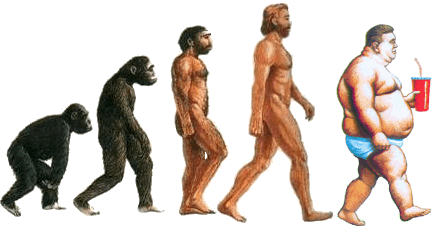
Would it be acceptable for a city to promote science or evolution,
instead of religion? For example, would a city be allowed to create
displays for the Christmas holiday that show animals evolving into
humans, as in the drawing to the right?
Is the military
allowed to promote religion, such as by displaying a Bible on their
ships or in their buildings? The First Amendment is so vague that a
lawsuit was filed
by a man who wanted the military to remove a Bible that they put on
display at a veterans' hospital.
• Can the
government require us to swear on a Bible?
|
The courts and some
government agencies require us to put our
hand on a particular Bible and swear an oath to a particular god.
Is that a violation of the First Amendment?
If the leaders of an organization are Muslims,
can
they make their members put their hand on a Koran and swear an oath of loyalty
to Mohamed?
If the leaders are Hindu, can they make their members swear an oath of
loyalty to Krishna?
If the leaders are atheists, can they make their members put their hand
on a copy of Darwin’s Origin of
Species, or Newton's Principia, and swear an oath to science or evolution?
|
|
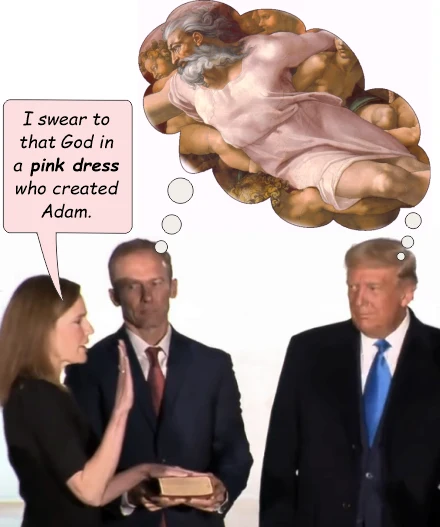 |
|
Are businesses,
college fraternities, military agencies, police
departments, or other organizations allowed to make their members
participate in initiation ceremonies that use weapons, as in the painting to the right?
Incidentally, as I pointed out years ago here,
some feminists accuse men of forcing women to wear dresses. Our school
curriculum should be altered to explain to students that men wore dresses until recently.
Also, note that the man in the painting to the right is wearing a
sleeveless red dress over his
chain link armor. The men watching the ceremony are also wearing
dresses.
|
|
 |
• Can
government agencies promote "God"?
The First Amendment forbids the Congress from
promoting a "religion",
but does that forbid other government agencies from promoting the
particular
"God" with a capital "G"? For example, is it acceptable for
the Federal Reserve to put "In God We
Trust"
on money?
If some Hindus are promoted to the top positions of the Federal
Reserve, are they allowed to change the expression to "In Krishna We Trust"?
If we replace the Federal Reserve officials with atheists, would they
be allowed to replace
that expression with "In Evolution We
Trust" or "In Science We
Trust"?
• Can schools
promote prayer?
Are schools allowed to make children pray? The First
Amendment does such a terrible job of explaining its
concept that the Supreme Court had to get involved to settle a dispute about
whether schools are allowed to promote prayers.
We should edit the confusing remarks, not
file lawsuits
The endless arguments and lawsuits over the meaning of the
First Amendment should be considered as proof that the First Amendment is vague and confusing. Ideally, our
leaders would react to that confusion by editing the First Amendment to reduce the arguments.
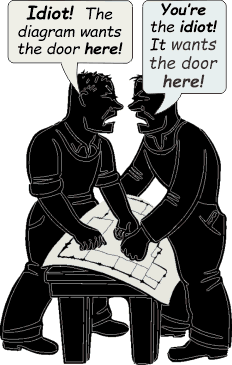
Would you respect
carpenters who argued over how to interpret a crude architectural
drawing?
|
It is absurd for us to argue over the
meaning of a law or other document, and even more stupid and wasteful to file lawsuits and
conduct fights in the courts.
If a group of carpenters were hired to build a house, and if the
architect
provided them with drawings that were vague and confusing, the
carpenters would not fight
with each other about how to interpret the crude drawings.
Rather, they would complain that the drawings are lacking detail.
They would tell the architect to provide them with the missing details.
If the US government officials were truly capable of providing us with
leadership, they would not ignore
the arguments and lawsuits over the First Amendment. Rather, they would
realize that the arguments are proof that the First Amendment is a failure, and that it needs to be edited.
They would realize that the First Amendment is a confusing, vague law
that
needs more detail. They would realize that
they need to improve and update the First Amendment.
When
architects create drawings that carpenters misunderstand, or when
businesses produce repair manuals that mechanics are confused by, they edit their
documents in an attempt to make them more understandable.
They do not
ignore the people who are confused about their documents. They take
responsibility for the confusion, and they try to reduce it.
Ideally, our government officials would react to the confusion about
the First Amendment by realizing that it is failing to achieve its
purpose of providing guidance to the people.
Our government should update the laws
In addition to editing the
First Amendment to make it less
confusing, our government officials should also update the
First Amendment to make it appropriate for our modern era.
For example,
as I pointed out here,
the First Amendment gives us the right to assemble in public because
the human
voice was the primary method of communication during that era.
Also, the cities were primitive.
There were not many conference rooms or theaters. Therefore, they would
hold meetings in public areas, such as a public street.
They did not have automobiles or railroads, so they could use a public
street without disrupting the other residents of the city.

Is
this what "peaceably to assemble" refers to?
|
Today,
however, the streets are full of cars, so it is no longer appropriate
for people to gather in a public street. Today it would make more sense
to require people to use one of the facilities that every city provides
for meetings. Today we also have the option of remaining at home and
having meetings through
the Internet.
Furthermore, the phrase "peaceably to assemble" is so vague that some
people are interpreting that to include screaming, throwing
rocks, blocking automobile traffic, setting fires in garbage bins, and
breaking windows.
Some people interpret "peaceably to assemble" to include protests inside restaurants, markets, and
other businesses, such as these
vegetarians who tried to embarrass, intimidate, and manipulate the
people inside a restaurant who were eating meat, and these
protesters who laid down in the aisles of a grocery store. Does the
First
Amendment give people the right to have such protests?
Ideally, our government officials would clarify
the phrase " peaceably to assemble"
so that it prohibits the obnoxious, destructive, and worthless
demonstrations in public areas, and inside of restaurants or markets.

The four sheets of
parchment that the U.S.
Constitution was written on are displayed in Washington DC, and with two guards standing by, as if they
are documents from a supreme being.
It is idiotic to believe that
we need to protect the words
of the constitution, or the parchment that they are written on.
Since there is confusion about what the words represent, we should edit
the words to ensure that everybody understands their meaning.
Unfortunately, not many government officials seem to realize that
they need to improve their constitution, laws, or other culture.
Government officials sometimes add
more words
to their constitution, but most refuse to edit the existing words, and most
would never consider replacing
a section with a new sequence of words.
Government officials ignore problems, rather than solve them
Our government officials do nothing to
improve our nation. The primary concerns of every nation's government
seems to be collecting taxes and eliminating competitors. It might be
easier to realize how worthless our government officials
are when you compare them to business executives. I will give an
example.
Example:
Bridges that are too low

Years ago I wrote
that our government officials are doing
nothing about a bridge that is so low that trucks were regularly being
damaged as they tried to pass under it.
That bridge has since been
given 8 inches more clearance as a result of the railroad company
lifting the bridge up by 8 inches in order to make the track more
level.
This has reduced the number of trucks crashing into it, but the bridge
is still too low.
I suggested the city lower the road, but this
video claims that the city looked
into the possibility of lowering the road, and came to the conclusion
that it cannot be lowered because
there are utilities underneath the road. The officials claim that
it would be too expensive and inconvenient to the people of the city to
move the utilities to some other location, or dig them up and bury them
at a deeper level.
The city officials eventually came to the conclusion that there is nothing they can do to improve the
situation, and so they have done nothing.
As a result, trucks are still occasionally being damaged as they try to
pass under the bridge.
This bridge is an example of our need to update
Business executives are
routinely encountering problems that are identical to the problem of this
bridge. This problem could be described as " equipment that has become outdated".
When the bridge was first constructed, it was adequate because there
were no tall trucks in that era. All of the vehicles could easily fit
under it. However, during the past few decades, trucks have become
taller, and that caused this bridge, and many other bridges around the
world, to become too low for the modern trucks.
Government officials around the world have had to deal with the problem
of old bridges that are too low for the modern trucks. Some officials
have
also had to deal with old bridges that are too weak for the modern, heavy
trucks and heavy farm equipment.
This
site shows some bridges in Europe that are too low or too weak.
Businesses have to deal
with this problem on a routine basis.
The managers of factories, farms, mines, and other businesses are
regularly having to deal with equipment that
is outdated. However, businesses do not claim that there is no solution to these problems. They find solutions rather than do nothing.
We have a government that cannot solve problems
because the voters consistently do a terrible job of selecting
government officials, and the voters don't replace the incompetent
officials.
We prefer to lounge, not work
As
I explained in other documents, animals are inherently lazy, and
this causes them to do their tasks as efficiently and quickly as
possible. Humans inherited that laziness from our monkey ancestors, and
this results in all of us having a preference for relaxing, retiring,
being pampered by servants, avoiding the chores that we don't like, and
doing
whatever we please at whatever casual pace we please.
Animals and humans put more effort into their tasks, and we do a better
job, when we are under pressure
to do the work.
The free enterprise system is very successful because it puts pressure
on us to work. Unfortunately, the pressure is to make profit, rather
than to improve human life, so a lot of the work that we do is
worthless or detrimental. If we had government officials who understood
these issues, and who had the courage to experiment with culture, then
we could experiment with an economic system that puts us under pressure
to improve our cities, flood control systems, transportation
systems, holiday celebrations, sports activities, and other culture.
Government officials are also under constant pressure, but in a
democracy, they are under pressure to pander
to voters.
If the voters were judging government officials according to their
achievements, and replacing those who accomplished the least, then the
officials would be under pressure to improve society. Unfortunately,
the voters are putting pressure on officials to titillate them with
praises and promises. As a result, government
officials can get away with doing
nothing.
When the city officials announced that there was no solution to the
problem of that bridge, the voters should have reacted by replacing
those officials. And the voters should have continued to replace the
officials until they elected an official who found a solution.
In
a free enterprise system, a business that gives up easily on finding a
solution to a problem is likely to go bankrupt. Likewise, athletes who
give up easily will be failures. However, government officials can give
up without any consequence. The voters will not care, and the money
that is wasted will come from businesses or taxpayers, not from the
government officials.
By comparison, if the manager of a factory ignored an outdated doorway
that was so low
that modern trucks were routinely crashing into it, the business would
suffer
because they cannot increase the prices of their products to cover the
wasted resources and labor. That incompetent manager would make it more
difficult for his business to survive. Furthermore, his employees would
regard him as an idiot, and
that would have a bad effect on their morale and attitudes.
The competition in the free enterprise system results in a business firing or demoting the managers who cannot
solve problems, or who ruin the morale of their employees.
If we were to restrict voting to people who have a more appropriate
attitude towards leadership, then the voters would behave like business
executives. Specifically, they would fire
the government officials who
failed to find solutions to problems. And if their replacements could
not find a solution, they would be fired also. Eventually this would
result in a government
official who finds a solution.
I have only spent a few moments thinking about that bridge, and I do
not have any information about the utility lines under the road, but I
can think of two possible solutions:
Possibility
#1: Close the road to vehicles
The
section of the road that goes under the bridge could be shut down. It
could either be restricted to bicycles and pedestrians, or it could be
provided to
a business to be used as a warehouse or other facility. There are
plenty of
alternative roads in that area. ( Take a look at a map of that
area.)
Some
people might respond that closing that
road would be a nuisance to some of the people in the city, but this
brings up another very important issue. Specifically, in the thousands
of years that people have been creating cities, no city yet has
provided itself with government officials who plan
the layout of the city. Instead, every city is a haphazard jumble of
buildings, roads, parking lots, utility lines, and other structures. In
every city there are people complaining about the location of the
roads, overpasses, airports, railroads, bridges, tunnels, utility
lines, and other
structures.
Our government officials have done such a terrible job of managing our
cities that there is no way to close a road, bridge, or tunnel, or
create a new road, bridge, or tunnel, without somebody complaining that
it would be
inconvenient to him.
Ideally, the voters and government officials would acknowledge that our
cities are inefficient, ugly, and wasteful. We should stop trying to
maintain our disgusting cities and start designing new and better
cities.
Unfortunately, that requires the voters to provide us with appropriate
leadership. Until that happens, we have to live in chaotic
cities, and
we should react by closing the bridges that are too low, and removing
the roads, parking lots,
tunnels, and other structures that are annoying or wasteful.
Possibility #2: Replace the
asphalt with steel
The city officials claim that they cannot lower the street because
there are utility lines underneath it, but how deep are those utility lines? The
depth may not be enough to lower an asphalt
road, but it may be enough for a steel
bridge.
In other words, as the diagrams below show, they might be able to lower
the road by replacing the thick
asphalt road with a steel bridge.
There
are so many
alternative roads in that area that I think it would be best to close
the road rather than put a lot of labor and resources into a steel
bridge. Also, the
utility lines under the road are extremely old, which means they
are likely to fail soon.
I think we should consider that road and the utility lines to be
hopelessly outdated, and close the road to automobile traffic. That
will also make it easier to repair the utility lines.
The bridge is just one example of our problem
Some
people might respond
that the bridge is insignificant because almost every bridge in the
world has enough clearance. They might accuse me of making an issue
out of an exception.
It is true that most cities do not
have a problem with bridges, but the bridge is just an example of how
every city and nation
has government officials who do
nothing to solve problems.
For example,
in some cities the officials are ignoring the areas that
are likely to be flooded, and other cities have officials
that ignore the problems of people building houses along cliffs that
erode into rivers or oceans. Other cities have officials who
ignore water shortages, overcrowding, traffic
congestion, homelessness, or the noise from highways, railroads and
airports. Many cities have officials that ignore the power
lines that break during storms, or they ignore the graffiti of teenage
gangs.
The US government also claims to be unable to solve the problem of
telemarketers, spam email
messages, and computer viruses. Are those problems
truly unsolvable?
Every city, state, and national government is also suffering from
government officials who ignore the problem that their government is
growing in size and increasing taxes on
a routine basis, but not doing
much in return for all of the money that they take from us. Our
government officials also do nothing about the increasing cost of
education and medical care.
That bridge is only one example
of how our government officials do
nothing to solve our problems or improve our nation. In some
cases the officials investigate a problem and then announce
that there is no solution, and
in other cases they ignore the
problem, and sometimes they blame
the problem on a rival political party.
Imagine if businesses did not keep track of payments
Another
example of how worthless our government officials are is that I pay my
property taxes online, but the government doesn't keep track
of who has paid their property taxes. Therefore, I regularly get an
email message that tells me:
From: Santa Barbara
Treasurer, Tax Collector
REMINDER NOTICE
If your taxes are already paid, please disregard this email.
This reminder notice is being sent to all registered website users.
The first installment of the ....
|
Imagine if every time you purchased an item
from an online business, you got this email message a few weeks later:
From: Accounts
payable
REMINDER NOTICE
If you already paid your bill, please disregard this email.
This reminder notice is sent to all online customers.
Your invoice was due two weeks ago, so if you have not paid it, please
do so as soon as possible.
|
If a business did not keep
track of who had paid their bills, their customers would be furious.
However, nobody cares that our government employees are that lazy and
incompetent.
It is also important to note that the California government is
collecting an enormous
amount of money from property taxes, so they can easily afford to hire computer
programmers to fix this problem.
Businesses are under pressure to respond to complaints, so many of them
have hired some employees specifically to handle complaints, but our
governments don't have anything comparable to a complaint department,
or a quality control department. Instead, they ignore our complaints.
The voters are supposed to
ensure that the government officials are behaving properly, but the
voters are too incompetent.
Businesses replace incompetent managers
Businesses
in a free enterprise system are under so much pressure from their
competitors that they cannot allow managers to get away with ignoring
problems. A manager who claims that a problem has no solution would
risk being fired,
especially if other managers, or competing businesses, have found a
solution to similar problems.
By continuously replacing the managers
who cannot solve problems, the
businesses end up with managers who look for solutions, and who do not give up easily.
|
It is common for government officials
to announce that there is no solution
to a problem.
Imagine a manager making that type of announcement at a meeting at IBM,
Sony, or BMW.
Do you think the other
managers would tolerate that attitude?
|
|
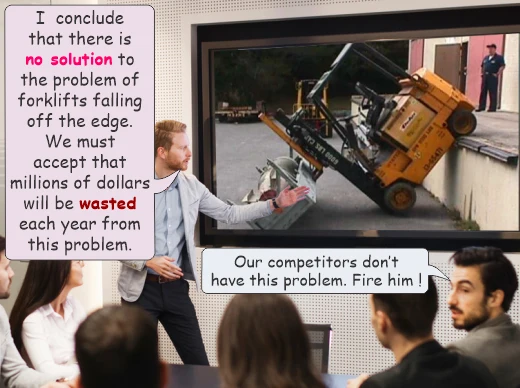 |
The people who are the most
successful in business, art, music, athletics, carpentry, gardening,
and other tasks, are not
"typical" people. They are not
a random sample
of the human population. Rather, they are people at the edge of the
Bell curve. They are more successful than ordinary people because
they tend to put an above-average effort into their tasks, and they are
the most likely to look for solutions
to problems. They are less
likely than the ordinary people to give up, cry, and beg for handouts.
|
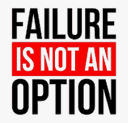 |
|
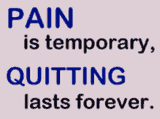 |
|
The attitude of
successful people can be seen in the type of remarks they make to one
another, such as:
• "Quitters Never Win"
• "We Fail Only When We Give Up". |
|
By comparison,
government officials have the attitude of a loser, or somebody who cheats to get what he wants, or
somebody who begs for handouts.
Voters should replace the government officials who cannot find
solutions to our problems. Voters should judge government
officials according to their accomplishments
and failures, not
according to their praise and promises.
The voters should compare the achievements
of the government officials, and replace
those who have
done the least to improve our
nation.
|
|
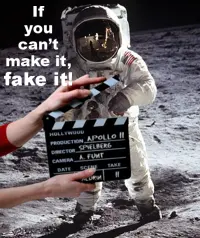 |
Our top government
officials should also have the
attitude of
routinely replacing the lower-level government officials who accomplish
the least.
For example, the FBI should set up a department to identify and arrest
the people who are sending spam email
messages and computer viruses. If the leader of that department had no
signs of progress after a certain
number of months, he should be replaced.
By continuously replacing the officials who accomplish nothing, the FBI would
eventually provide itself with officials who have the ability to reduce crime.
However, the voters allow the FBI officials to get away with doing
nothing about
some crimes, covering up other crimes, and participating in some
crimes. Even more shocking, millions
of voters support the attempt by the FBI to convince us that some
Russians are the reason President Trump was elected. Instead of replacing the corrupt FBI officials,
those voters support the
corruption.
No
business would ignore a security department that was as corrupt
and incompetent as the FBI. Only government officials and voters allow
such extreme levels of abuse, corruption, and incompetence to go on
year after
year, decade after decade.
Sometimes it is sensible to give up
To make this issue more
complex, there are situations when it is sensible to give up on a
project. For example, I pointed
out that many nations have put a lot of labor and resources into
developing fusion reactors,
but we have accomplished nothing
after many decades.

We should consider the
possibility that fusion reactors require much more knowledge than we
have today, and that we should postpone the project for the future
generations. We should also consider the possibility that fusion cannot be controlled, and that a
fusion reactor is as unrealistic as a perpetual motion machine.
When a business continuously puts money into a project that fails to
show progress, they will terminate the project. A business will go
bankrupt if they continuously put a lot of labor and resources into a
project that has no progress.
By comparison, governments can waste phenomenal amounts of money for decades
on fusion, atom smashing machines, foreign aid, crime, and other
projects that have no progress because governments don't have
competition, and voters do not hold government officials accountable
for their failures.
Terminating a project is not "giving up" if we have intelligent reasons
to believe that the project is either impossible,
or requires technology that we don't
yet have. For example, there are intelligent reasons to give up
on a project to find the end of a
rainbow or a fountain of youth,
or postpone a project to create an artificial
eyeball for blind people until our technology becomes more
advanced.
How many historians care
about the truth?
The story that Ponce De Leon was looking for a fountain of youth in
Florida is said
to be a "myth" or a "popular legend". If the story is false,
why are we continuing to promote it centuries after his death? Will
people in 50,000 A.D. also repeat this and other false
stories?
That is just one of many
false stories that are still being passed from one generation to the
next. When we allow authors
to mix entertainment and false information with educational materials,
some people,
especially children, are likely to believe some of the nonsense. For
example, some Americans claim that Abraham Lincoln walked 3
miles or 6
miles to return a penny or three
pennies. By exposing children to different variations of this event,
there are people posting questions on the Internet about how many miles
Lincoln walked, and how many pennies he returned.
The free enterprise system encourages this nonsense because the people
who create historical documentaries, children's books, and magazine
articles are trying to
titillate the public, and they often do this by including some "myths"
and "legends". An example is this
episode of Inside Edition in which we are told:
Indiana Town
Believes Old Jail Is Haunted by Ghosts of Former Inmates
How many people in that town believe the jail is haunted, and who are those people? A "real"
scientist has to document his sources of information, but the
people in the social sciences are allowed to provide information based
on "some people say", or "they say", or "according to a popular legend".
In November 2020, PBS published this
video documentary about Lapland. Since this is one of their most recent
documentaries, it should be an improvement
over the documentaries that were created decades earlier. Video cameras
have improved, but there has been no
progress in the quality or accuracy of the information that
people in the social sciences are providing to us.
For example, all throughout the documentary we are told about legends and myths. The description of the
documentary also does this; it describes the documentary as being about
" the fabled
home of Santa Claus":
Get
an intimate look at the wildlife of Lapland, a region in northern
Finland, the fabled home of Santa Claus and actual home of reindeer,...
We
should find the courage to experiment with a better economic and
government system so that the people who create documentaries can stop pandering to
the public. We should raise standards for the social sciences to such a
high level that the documentaries have to remove all of their idiotic
but entertaining remarks. The description of that documentary about
Lapland should be serious and informative, such as:
A documentary about the wildlife of
Lapland, the northernmost region of Finland, such as the reindeer,...
Imagine if engineers included entertainment in their documents. For
example, imagine if the Boeing engineers created a maintenance manual
with instructions like this:
Boeing 787 Maintenance Manual
Every
5000 operating hours, give the joints of the compressor levers some
grease with a base oil viscosity of less than 200. A popular myth is
that if you rub some of the grease on your nose, you will have good
luck for the rest of the day.
Replace
a turbine blade if it has any visible cracks or chips, no matter how
small.
A town in Indiana believes that if you hold one of the damaged blades
above your head and rotate twice clockwise, you will purge the engine
of ghosts.
|
Authors are partly
responsible for the popularity of nonsense
The authors who promote
legends and myths might respond that they are
telling us about them because they are
popular.
However,
one of the reasons that they are popular is because there are so many
authors promoting the legends. If we had higher standards for
journalists, then journalists would ignore the idiotic myths, thereby
reducing their popularity.
In some cases, the authors are the only
reason that a concept is popular. For example, none of us would know
about "crop circles", the Bermuda Triangle, or Bigfoot if it were not
for
a group of criminals who created the concepts.
Another example is that the Oxford University Press selects a " Word of the Year",
and for 2018 they selected
the word "toxic". They claim that the word was popular that year, and
that second most popular use was for the expression toxic masculinity.
However, the expression " toxic
masculinity" is popular only because a group of criminals
are trying to manipulate our attitudes. If it had not been for those
criminals, none of us would know of such an expression.
Information
is false even when it is based on a true story
Children are also picking
up false information from Hollywood movies
and books that are "based on a true story". Information that is "based
on a true story" should be described as "fiction" because it contains false information.
Furthermore, it should be noted that even the most unrealistic
work of fiction could be described as "based on a true story". For
example, the Discovery Channel could create a documentary about "The
Monsters In Our Homes". The documentary could boast that it is "based
on millions of true stories", and they could "prove" it by providing
some interviews in which children testify that they know for a fact
that there are monsters hiding in their closet or under their bed.
Historians, journalists, and other people who provide us with
news reports and historical information should meet the same high
standards as engineers. We
should not allow anyone to
claim that his information is "based
on a true story". We should make a clear distinction between entertainment and educational information.
Imagine if engineers were to create a maintenance manual for the Boeing
787 that was "based on the truth", but which contained some false
information and exaggerations in an attempt to make the manual more
entertaining.
The free enterprise system is causing businesses and authors to manipulate and exploit us rather
than look for ways to improve our lives. Can you find the
courage to experiment with a more advanced economic system?
Government
officials can benefit from
incompetence
Instead of getting fired
for incompetence, government officials can actually benefit
from it. Specifically, when they are near the end of their
term in office, they can announce to the voters that the problems are
so
complex that they must be reelected
in order to finish the task.
In other words, by doing nothing about a problem, they can use the lack
of success as justification to be
reelected.
By comparison, when an employee of a business has no progress in his
tasks, he is replaced. The
managers of a business are too intelligent to be fooled into keeping
him on the payroll for four more years.
If the voters would replace the most incompetent leaders, we would
eventually have
government officials who are successful
in solving problems.
We would have a government in which the officials are routinely finding
ways to improve the design of our cities, the clarity of our laws, and
the efficiency of the government agencies. The officials would also
routinely find improvements to our work environments, social affairs,
holiday celebrations, schools, recreational activities, children's
activities, and other culture.
Free enterprise does not give us the best
leaders
Although
business executives tend to be much more talented than government
officials, they are not necessarily as useful as they should be. The
reason is
because a free enterprise system puts
business executives into competition to make profit, rather than to improve society. This gives us
business executives who excel in making
profit, not who excel in improving society.
If
the only way a person could make profit was to improve society, then
the competition to make profit would provide us with business
executives who excel at improving our lives. Unfortunately, we can make
profit in a variety of undesirable ways, such as joining crime
networks, forming friendships and marriages according to how we can
benefit financially, and exploiting consumers and laws.
Another problem with free enterprise is that it gives us business
executives who excel at pandering
to consumers. This can result in business executives who excel in
providing us with emotionally appealing products and services, but
which may be worthless or wasteful.
For example, there are businesses developing
the technology to start a colony on Mars or the moon. These businesses
are emotionally appealing to a lot of people, but from the point of
view of society, they are wasting labor and resources because we do not
yet have the technology to do that. These businesses are making
promises that they cannot keep, similar to political candidates who
pander to the voters. The Mars One project has
already gone bankrupt.
If we truly want to start a
colony on another planet, we should first create a large space station
with artificial gravity,
and make sure that it is self-sufficient
in its
production of food, water, and oxygen. It should also have maintenance
facilities to deal with routine problems. It could then travel to the
moon, Mars, or anywhere else,
without
needing supplies from the earth.

We should build a self-sufficient space
station before trying to colonize Mars.
|
That
space station would make creating a colony
on Mars much more practical. While it is still orbiting the earth, it
could
be provided with all of the equipment and supplies necessary to start
a colony on Mars. It would then travel to Mars, and it would orbit Mars
while some of the people traveled to the surface of Mars to create a
colony.
Creating that giant space station would require a tremendous amount of labor and
resources,
and supplying it with the equipment necessary to start a colony on Mars
would also require a tremendous amount of labor and resources.
However, it would be less
work, and less dangerous work, than sending lots of small rockets to
Mars and expecting a few people to create a
colony with the extremely limited amount of food and equipment that
those
rockets could supply them with.
I suggest you consider that the reason so many people believe that they
can create a colony on Mars within a few years is because they cannot
see how difficult the task is. I mentioned this concept in other
documents; specifically, the less we know about something, the more we
think we know. We must learn a certain amount about an issue before we
realize how ignorant we are.
We have been building a space station for decades, and this has made us
fully aware of how difficult
such a project is. We have yet to understand what is required to create
a colony on Mars, and this causes us to assume that it will be an easier task.
Likewise, we have no idea how to control nuclear fusion, and this allows us
to assume that it will be easy
to do it. However, it may require much
more intelligence than any human has,
and so it may not happen until humans have evolved for another 2
million years. It may also turn out to be impractical or impossible.
People 20 million years from now might regard our fusion projects in
the
same manner that we regard the attempts to create perpetual motion.
Free enterprise encourages idiotic projects
to continue
Some of the
people who have gotten involved with projects that they later decide
are unrealistic may continue supporting the project simply because of
the difficulty of finding another job.
One of the many problems of a free enterprise system is the difficulty
of getting funding for a
research project or business, or finding another job. This can cause us
to support a project even
when we realize it is worthless or hopeless, and it can cause unions
to resist new technology.
The U.S. Constitution belongs in a museum, not a display case
The Articles of the Barons,
Magna Carta, Declaration of Independence, Articles of Confederation,
and the U.S. Constitution belong in a " Museum
of Culture".
Also, it
could be a museum on the Internet, rather than a physical museum. In
such a case, the museum would have images of the original documents,
and the text of the documents. That Internet site would resemble the
document the IFAB created to show their history.
By putting such
documents into a museum, the future generations will
be able to learn how their culture evolved to what it is. For three
examples of what the future generations could learn from such a museum:
1) Why our
ancestors are a certain religion
The USA has hundreds of
variations of Christianity. This
list has more than 200, and the Wikipedia has more
information.
When I was a child, I wondered why one of my grandmother's family chose
the Lutheran religion. In addition, they could have chosen one of the
many non-Christian
religions, or one of the variations of atheism.
Her ancestors came from Denmark, and a Museum of Culture would show
that the
Danish constitution makes the
Lutheran religion the official religion of the Church of
Denmark. Therefore, I don't think that my Danish ancestors chose the
Lutheran religion. Rather, they accepted it
because they had grown up in a nation that was pushing it.
One of my grandfathers came from a Catholic family that
emigrated from Italy, and a Museum of Culture would show that the
Catholic Church has been much more aggressive in pushing the Catholic
religion than the Danish government has been in pushing
the Lutheran religion.
By comparison, the U.S. Constitution forbids the government to promote
a religion, and it gives us the right to believe whatever we please.
This freedom has resulted in the American citizens creating hundreds of
variations of
Christianity, atheism,
paganism,
and other religions.
2) Culture can be in any "form"
A Museum of Culture would
help people realize that it doesn't
matter what form
our culture is in. Culture is just some intangible instructions in our
mind, and it doesn't matter how
we transfer those instructions from one mind to another.
A Museum would show that our prehistoric ancestors passed culture with
their voice, and by observing one another. About 4000
BC, the Sumerians began writing some of their laws and other culture on
clay tablets.
During the Middle
Ages, the Europeans were creating documents on animal skins and linen
paper, and they wrote words with bird
feathers that they dipped in ink.
The
museum could show how the feather pens evolved into pencils,
typewriters, and ballpoint pens. The trend during the
past few decades is to use computers to create electronic
documents, and to replace keyboards with speech recognition software.
Some people today are
complaining that the new generation of people are not reading books,
but it makes no difference whether a person gets information from an
electronic document, sheets of paper, or clay tablets. We should not
care about the form that
information is in. We should instead care about the quality and value of the information.
We should be concerned about what we put
into our mind, not the method
we use to transfer the information from one person's mind to another.
I regard paper books as inferior
to electronic documents because they
cannot be searched, and they cannot provide high quality photos,
videos, audio files, or interactive software. Furthermore, they cannot
be edited, and we cannot copy and paste sections of them into email or
other documents.

I predict that paper books
will continue to dwindle in popularity as computers become increasingly
advanced. It is possible that the people a few thousand years from now
will have such advanced 3-D displays
that they will not want paper documents. There may be no such thing as
a library of books, or a home
with a bookcase.
3) Our craving to mimic
other people
A Museum of Culture would
help us realize that we have a strong desire to mimic one another rather than
experiment with our options.
For example, the Magna Carta was written
in Latin, rather than the
version of English that the people were speaking at the time. No
society had been using Latin for centuries,
and not many people could read Latin, so the Magna Carta was unintelligible to the majority of
people.
|
The
Magna Carta |
|
Newton’s
Principia
|
|
|
 |
Despite the
absurdity of using Latin, the Europeans used Latin for more than a thousand years.
For example, in the 1680s, Newton wrote all three books of the Principia
in Latin.
|

|
|
The people who created the
USA
did not use Latin for their documents, but they used Latin
for certain things, such as putting " E Pluribus Unum"
on the Great
Seal of the United States.
That Latin expression was regarded as the motto for the USA, but in
1956 the Congress declared that the phrase " In God We Trust"
will be our official motto. That was one of the few times the US
government made a change to our culture, but I would not describe it as
an "improvement". Rather, the Congress was pandering to the religious
fanatics.
A Museum of Culture can help us understand
our animal characteristics
If we design a Museum of
Culture to appease people, we
will design the museum so that
people enjoy it.
For example, the display of the Magna Carta and Newton's Principia
would claim those documents were written in Latin because the authors
were intelligent and educated. However, that type of museum is a form
of entertainment,
not a useful educational tool. It would titillate people's emotions, not
educate them or stimulate intellectual discussions. It would
have no
value in helping us to understand our culture, our behavior, or what
our options for the future are.
By comparison, if we design a Museum of
Culture with the same serious attitude that a chemist describes
ammonia, then the museum would treat humans as if we are just another animal. The museum
would educate us rather than entertain us.
For example, in regards to explaining the use of Latin, the museum
would point out that there was never a time in human history
at which people discussed which language they should use for their
documents. Rather,
people used Latin for thousands of years simply because humans evolved
from
monkeys, and we inherited their
craving to mimic one another. The
museum would also point out that just like animals, people have
continuously displayed a fear to try something different and explore
our options.
That type of museum would help us to understand why our culture became
what it is, and that knowledge can help us decide which aspects of our
culture we ought to consider improving.
To
rephrase that concept, when we understand that we have a strong desire
to mimic other people, we will realize that we should analyze our
culture and determine which of our customs we are following simply
because of our desire to mimic other people. We should then analyze
those customs and pass judgment on whether they are sensible enough to
continue following, or whether we should terminate or alter them.
The religious fanatics would condemn that type of
museum for treating humans as animals, but we should not design a
museum to appease anybody. In order to be useful, a museum needs to be
as accurate as possible.
We learn nothing about
ourselves or our culture when we claim that our ancestors used Latin
because they were educated and intelligent. That is not a scientific explanation of how
our culture became what it is. That is just boasting.
By comparison, when a museum shows us
that we have been using Latin for thousands of years simply because of
our desire to mimic one another,
then we will get a more accurate and useful understanding of our
culture,
and that in turn can help us make better decisions about which of our
customs we ought to
terminate or update.
Incidentally,
you might find it amusing to consider what the Magna Carta, Principia,
and other documents would look like if the Europeans had decided to
mimic the Egyptian hieroglyphics
or cuneiform,
rather than Latin.
|
The
Great Seal of the USA |
|
With
Egyptian hieroglyphics
|
|
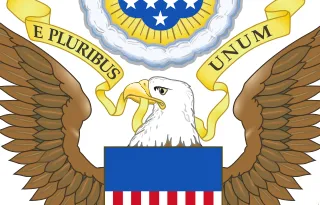 |
|
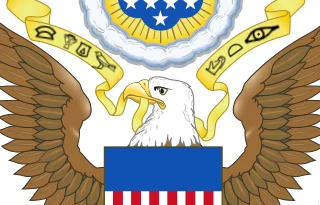
|
A Museum of
Culture would also show us that
our desire to mimic, our fear of exploring our options, and our
resistance to thinking has nothing
to do with whether we are stupid or intelligent, or whether we are
ignorant or educated. The museum would show that many of the most intelligent and educated people behave similar to
animals. We behave like animals
when we follow our emotional cravings,
rather than use our intelligence
to make decisions.
In order to behave better than the animals, we must be aware that we
inherited the emotions of monkeys, and we need enough
self-control to push ourselves into thinking
about what to do. We must also be able to occasionally choose to
"suffer" with a policy that is emotionally unpleasant but
intellectually sensible.
Unfortunately, most people do not realize – or they refuse to believe –
that they have the emotional cravings of a monkey. Most people believe
that their emotional feelings are sensible,
and that they will get more enjoyment from life by titillating their
emotions. They believe that they are suffering when they cannot satisfy
one of their cravings. As a result of this attitude, they tend to
stimulate themselves, and their children, to excess rather than try to
control their cravings. Of the people who realize that they should
control their cravings, many lack the self-control necessary.

The end result is that most
people do whatever is most emotionally titillating, just like the
animals, such as pandering to their children, mimicking one another,
eating excessive amounts of food, becoming
hysterical over abortion, committing crimes in order to get more
material wealth, fighting one another for status, having sex with
Harvey Weinstein in return for becoming a famous actor, and joining a
crime network in return for their help in becoming a government
official.
The crude, animal behavior of the majority of people is the reason why
a small number of criminals, corrupt government
officials, kings and queens, priests, Hollywood celebrities, and
journalists can so easily manipulate enormous numbers
of people.
In order for us to improve the world, we need more people who can
acknowledge that humans are monkeys,
and who have enough self-control
to behave better than a monkey.
We should learn from our ancestors, not mimic them
When an engineer is trying
to improve an oven, refrigerator, or robot,
he does not ignore the work of
other engineers, and he does not mimic
them, either. Rather, he analyzes their accomplishments and failures,
and he tries to learn from
them and improve upon their
accomplishments.
We should encourage that same attitude with culture. We should not
ignore the culture of our ancestors or other nations, and we should not
mimic any of their culture, either. Rather, we should analyze our
culture and the culture of other societies, and we should try to improve our culture.
We need pressure to change our path in
life
It should be noted that
when the Articles of Confederation failed, the
authors of the constitution decided to look at the governments of
other nations, and try to learn from
them and create something better.
This brings up a very important aspect of human and animal behavior
that we should be aware of, and we should try to keep under control.
Specifically, we have a strong desire to follow along the same path forever, and we
consider changing paths only when
we are suffering
to such an extent that the pain of
continuing along the same path is
strong enough to overpower our fear of the unknown and our arrogance.
For
an example, the Articles of Confederation did such a terrible job
of managing the USA that the people began facing extreme economic
and social problems. The problems were so severe that
it was essentially a punch in their face. It caused them to suppress
their arrogance, stop believing that they knew everything there was to
know about governments, and try to
learn from the mistakes and successes of other societies.
You should be able to see this concept in your personal life, or in the
lives of other people. For example, some alcoholics have refused to
admit that they have an alcohol problem until it caused serious
suffering in their life, such as a divorce, liver cancer, or getting
fired from their job. That suffering can cause an alcoholic to suppress
his arrogance, be more critical of himself, acknowledge that he has a
problem, and make an attempt to improve his behavior.
We could summarize this characteristic by saying that animals and
humans become willing to change their path in life when they are suffering to a significant extreme.
Another way to express this characteristic is that we do not want to
improve our life if we are already enjoying life, or if our
suffering is below the level necessary to overpower our desire to
follow the same path. An expression for this
characteristic is:
“If it ain't
broke, don't fix it!”
If we are aware of this characteristic, and if we
have enough self-control, then we can
experiment with our culture simply to improve our lives,
rather than wait for our culture to "break". Unfortunately, no nation
yet promotes such an
attitude.
Example: Cheating in elections
An example of this attitude is how people have been ignoring the
evidence that cheating occurs during elections. There has been evidence
of cheating for decades, and
even the ordinary people should have enough intelligence to understand
that a secretive voting system
is very easy to cheat. However, most people have ignored the evidence
of cheating until the 2020 election, when the cheating was on such an
extreme scale that it upset some people to the point at which they were
willing to change their path in life.
At the time I am writing this document, it seems to me that Trump
won the election by many millions of votes, and that the Democrats
had to cheat to an extreme in order to make it look as if Biden had won
the election.
This makes me wonder, if Trump had won the election by only a small
amount, the cheating would have been on small scale, so how many of the
people who are complaining about the cheating would have complained in
that case? I suspect that most people would have ignored the cheating, and Joe Biden
would become the next president.
We must agree on the concepts the words
represent
At some point in the
future, people will have government systems,
school systems, and other culture that is much more advanced than what
we have today. If we could visit a Museum of Culture in the year 5600
A.D.,
we would have a much better understanding of how crude our culture is
today, and how much it can be improved.
For
example, their display of the evolution
of government systems
will show that the Magna Carta was written in Latin on one sheet of
parchment, and the U.S. Constitution of 1787 consisted of four sheets
of parchment, and
the constitution that I am proposing is a much more extensive and
detailed set of electronic HTML documents.
Their museum will show that sometime after 2020 teams
of people began competing with each other to develop improvements to
governments, school systems, and other culture, just as teams of
engineers compete to develop improvements to robots and refrigerators.
Those
future museum displays will show that the documents that set up
governments, social affairs, businesses, bicycle races, marriages, and
other culture have been edited over and over, century after
century.
Those displays would help people realize that the words in our cultural
documents are just symbols of
no importance. The important
aspect of the documents is the concept that
the symbols represent.
Therefore, if different people decode the words into slightly different
concepts, we should react by realizing that the words are failing to do their job of
accurately passing the concept from one person's mind to the next. We
should react to that problem by editing
that document, and the editing should continue
until we all agree on what the words represent.
A legal document
should be treated like an engineering
diagram
When
engineers
design a
refrigerator, they create a set of documents that explain to people in
a factory
how to produce the refrigerator, and they create other documents to
explain to the user how to operate and maintain the refrigerator, and
they
create other documents to provide instructions for the technicians who
repair
the refrigerator.
Engineering
documents are analogous to a nation's constitution,
and also to the "rules" that the USA Cycling group has created, because
they are sets of instructions to unite and organize a group of people.
The only difference between the documents that engineers create and the
documents that the USA Cycling group creates is that the engineers
produce instructions to organize a group of people into producing material items, and the
USA Cycling group produces instructions to organize a group of people
into producing bicycle races.
|
What
would you think if engineers at Ford regarded the Model T as the "Greatest Automobile Ever
Created"?
Imagine that they put the diagrams for the Model T in display cases
that are protected by armed guards.
Imagine that the engineers refuse
to modify the diagrams, and insist on producing the same model forever.
|
|
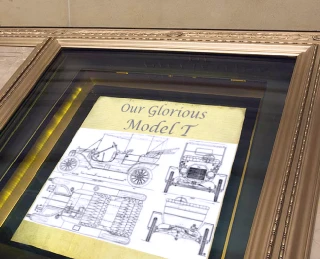 |
Businesses
in a free enterprise system are in competition, so they are under
pressure to find improvements to their
products and services. However, imagine if Ford was the only automobile
company in the world. In such a case, Ford would be a monopoly, and that would allow them
to be as
incompetent and inefficient as a government.
For
example, without competition, they would be able to produce the Model T
forever
without any
concern about being driven to bankruptcy.
What would you think if the engineers at Ford were still
producing the Model T today
because they insisted that it is the greatest
automobile ever created? What would you think if the engineers insulted
a person as a traitor
to Ford if he suggested changes to the Model T? Imagine the
engineers responding to suggestions for improvements to the model T
with such angry remarks as:
"It is better to play it safe and follow established traditions than to
conduct reckless and dangerous
experiments with technology that has proven
to be successful!"

Imagine if engineers were as resistant
to improvements as government officials.
|
Furthermore, imagine that
Ford was requiring their engineers to use Latin in
their engineering documents. How about if they also wrote the User's Manual and Repair Manual in
Latin?
And imagine that Ford required the employees to wear powdered wigs and use feather pens.
What is the difference between:
a) A business
that boasts that it follows the traditions set by the founders of the
business, and that those founders did such a perfect job that it is
idiotic for somebody to suggest improvements to
their product or business.
b) A nation
in which the people boast that they proudly follow the culture of their
ancestors, and that anybody who suggests experimenting
with changes is a radical, extremist, traitor.
Engineers are proud
to improve a product
Engineers and scientists never boast that they are following
the technology of their ancestors. Rather, they boast about improving the technology of their
ancestors.
By comparison, most people are proud of themselves when they mimic the
culture of their ancestors. They boast that they follow "long-established" procedures that
have been
"proven" through the
generations, or that they are "carrying
on a proud
tradition". Some people justify their religion with a remark
similar to:
"The Bible has survived criticism
for 2000 years.
It has proven itself. It has stood the test of time."
Rather than improve their culture, most people try to stop
people from experimenting with culture. If the typical person were to
create a Museum display to show the history of his culture, he would be
proud to show that he is following the same
policies
for crime, government, drugs, marriage, and abortion that his primitive ancestors were
following thousands of years earlier.
|

|
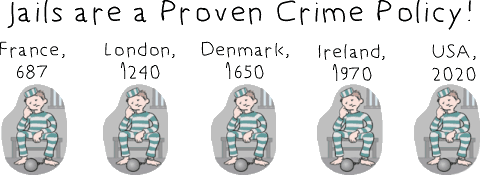 |
Imagine an engineer boasting
that he refuses to make changes to some primitive technology because he
follows " established and proven"
engineering designs, rather than " experiment
with radical, extremist speculations".
If Ford had been a monopoly, and if they continued producing the Model
T for centuries, the engineers
of the future would be able to boast:
"The
Model T has been successful for centuries!
It has stood the test of
time and proven itself to be the greatest automobile
ever designed! It
has a proud tradition, and has
been highly respected by all generations."
No engineer is that
ignorant or stupid. Instead, engineers are
constantly looking for ways to improve
their designs. They are also
willing to edit their
documents to make them less
confusing to the people who must assemble, use, or repair the products.

A
tractor at the John Deere Museum
|
Engineers often create displays
of old diagrams, prototypes, and products, but they do so in order to learn from
the successes and failures of previous engineers, and to allow people
to learn how technology has improved through the years, not to promote
old technology.
An example is the display
of farming vehicles that John Deere created to show how their farming
technology has improved.
That type of display is useful for the engineers who design farming
machinery, and for any citizen who is interested in learning how
farming technology developed.
Engineers
routinely analyze previous products in order to build upon the
achievements of other engineers, and to avoid the mistakes of other
engineers.
Ideally, government officials would also
try to learn from the successes and failures of previous societies, and
add to the achievements of previous
generations.
What would a Museum
of Culture show for sports?
Sports
have changed quite a bit during the past few thousand years, but the
changes
have been trivial during the past few decades. This can cause us to
assume that most of the major changes are finished, and that the people
a million years from now will have very similar sports.
In this section, I want you to consider that there might be some dramatic
changes in sports and other culture. Specifically, try to imagine what
a Museum of Culture in 3600 A.D. might show for the sport of bicycle racing.
The museum's display would begin by showing that bicycles developed
during the 1800s. If there
were any bicycle races in the early 1800s, they were not documented, so
they would have been as informal and spontaneous as when a couple
friends are at a beach and have an
informal "contest" to see who can skip a rock farther along
the surface of the water.
The first
bicycle race to be documented was held in 1868 in Paris,
France. It was for a distance of 1200 meters on a gravel path. The
winner rode a wooden
bicycle with solid rubber tires.
The museum would show that none of the men who were involved with
bicycle races during the 1860's were training full time for the events,
or hiring coaches to help them become better at racing. There were no professional
bicycle racers in that era.
The museum would show that
the sport evolved during the following decades into a
variety of different types of bicycles and races. The museum would also
show that the sport evolved to the point at
which people could make a living as a competitor in bicycle races.
At that point, the "ordinary" people were no longer capable of
qualifying for a bicycle
race. Instead, a small group of athletes competed,
and the ordinary people watched
the contests. This caused bicycle racing to become a " spectator sport".
The museum would show that the athletes eventually became so concerned about winning the
contests that the athletes
were training for the contests, and many were working with
coaches and/or risking their health by experimenting with drugs,
hormones, and steroids. The museum might help people get a better idea
of how extreme the
athletes were pushing themselves to win by showing such photos as the
veins in the leg of
Bartosz Huzarksi ( photo, below right),
which he posted after completing
a section of the Tour de France race.
|
 |
|
 |
|

|
|
|
A
wooden bicycle; 1800s
|
|
Tour
de France, 2014
|
|
Leg
veins after a race
|
|
The museum
would show that during the 21st century there were many businesses
putting a lot of labor and resources into developing extremely
lightweight, aerodynamic bicycles made of carbon fiber.
The museum would also show how the speed of the bicycles was
increasing through the years as the bicycles and roads became more
advanced, and
as the people put more effort into training. For example, in 1873 a man
rode a bicycle for an hour and reached a
distance of 23 km, and a century later many people were riding more than twice that distance in an
hour.
Our culture will
eventually seem crude and miserable
The reason I want you to
consider what a museum would show for bicycle races is to encourage
you to wonder how sports and other culture might change
in the future.
We assume that we have the best culture possible, and that the future
will be a continuation of the present, but it is very unlikely that
people in 60,000 A.D. will live in the manner that we are living,
or have the same sports or recreational activities that we have today.
They are much more likely to regard our culture as being only slightly
better than that of the Middle Ages.
The previous document of this series showed
a section of Pieter Bruegel's painting of children's activities in
1560, and two photos of a Chinese facility for children in 2020.
Children's activities have changed dramatically
during the past few
centuries, and we ought to consider that the social and
recreational activities of adults are going to change dramatically in
the
upcoming centuries.
We regard the previous few centuries as being an "Industrial
Revolution" because there was a tremendous amount of technical progress
during a relatively short period of time. I think
there will eventually be a point in the future at which the human race
has the social equivalent. The
people in the distant future will regard it as a "Cultural Revolution"
because it will be a time at which culture advances rapidly.
That cultural revolution will be a time when the people start taking
control of their culture rather than letting it be manipulated by
businesses, crime networks, religions, and idiots. They will start
conducting research and experiments with sports, holiday celebrations,
clothing styles, school curriculum, economic policies, and other
cultural issues, and they will make changes according to what provides people with the best life,
not according to what people want or like.
I suspect that there will be a time in the future at which the
people have become so knowledgeable about human culture and human
behavior that they have made significant changes to virtually all of
the sports, recreational, and social activities. If we were to travel
thousands of years into the future, I don't think we would recognize
any of their activities.
That cultural revolution will be a time at which "social science"
finally becomes a real and
productive science. It will be similar to the time during the Middle
Ages when people began abandoning alchemy and developing chemistry,
biology, metallurgy, and other sciences.
It will be a time during which the future generations abandon
religions, Freudian psychology, voodoo, Marxism, and other nonsense,
and acknowledge the evidence that humans are a species of monkey.
This change in attitude will allow them to understand human behavior
and culture, which in turn will allow them to develop more appropriate
governments, economic systems, school systems, city
designs, holiday celebrations, and other culture.
In regards to sports, I predict that there
will be a time in the future at which people start coming to the
conclusion that their monkey-emotions are causing them to put too much emphasis on winning a meaningless
contest, and that they should change the events to make
them more useful.
The
museum displays of the distant future will show how this change in
attitude affected all of the sports and recreational
activities. For example, the museum will have displays that show how
the bicycle races of the 21st century
were extremely competitive events in which the athletes trained
full-time, used a lot of drugs and hormones, and rode on extremely
advanced, aerodynamic, carbon fiber bicycles. The museum will then show
that the bicycle races of the 22nd
century, or maybe it won't happen until the 26th century, were significantly different because the
people lost their interest in winning. They stopped
training for the events, stopped using drugs, and stopped giving prizes
to the winner.
I think the future generations will also stop putting research into
making bicycles faster. Instead
they will switch to making bicycles more comfortable,
safer, quieter, and resistant to mechanical failures and flat tires.
I also suspect that the museum will show that there was a point
in time at which the people decided to make their sports and
recreational activities more visually
interesting.
They would design their bicycles, volleyballs, and other recreational
equipment and clothing to be more decorative.
If that
prediction seems strange to you, consider how meals have
changed during the past few thousand years. Our prehistoric ancestors
ate their meals just like monkeys do; specifically, sitting on the
ground and eating food with their hands. Although there are still
millions of people who put a bowl of food up to their face and shove
the food into their mouth with chopsticks, there are millions of us who
prefer to eat
with forks and spoons at a decorative
table, and have the food prepared in an artistic manner.
|
We
prefer decorative dinner tables. |
|
We
prefer decorative food.
|
|
 |
|

|
I
suspect that there will be a point in the future at which people stop
putting emphasis on gathering material items, giant homes, and
trophies, and switch to enjoying activities, people, and the universe.
They will want everything in their lives
to become visually attractive. They will be intolerant of ugly cities,
ugly roads, ugly sidewalks, ugly factories,
and ugly foot paths. They will want their entire city to be attractive, clean,
and quiet. They will also want their recreational and social
activities to be more visually pleasant.
It is impossible for us to create a beautiful city today because we
cannot control the design or layout of a city when we are using a free
enterprise system, or a democracy. The only way we can create a
beautiful city is to create a government that has dictatorial control
over the design and layout of the city. This requires taking away
everybody's freedom to build their own homes, factories, parking lots,
and other structures. The city government must be able to own all of
the land and all of the buildings so that they can control the design,
placement, colors, and features of all of the city structures, farms,
utility lines, foot paths, and canals.
The governments of today are too corrupt and incompetent for that type
of city, but I predict that the "Cultural Revolution" will result in
truly impressive and talented government officials. Furthermore, people
will change their attitudes towards life. Instead of fighting each
other for food, homes, and material items, they will switch to
something similar to what I have proposed, in which material items are
provided for free.
It will be much easier for
people to create a beautiful city for themselves when the government is
in control of the city, land, and material items because it is much
easier to create and maintain community property compared to private
property.
Instead of the situation we have today, in which every family must
purchase and maintain their own bicycles,
drones, recreational equipment, private yards, and private swimming
pools, the city will provide everybody with a much wider variety of
higher-quality swimming pools, gardens, social clubs, and recreational
activities. This will give the people access to material wealth that
they could not afford or maintain.
|
Some
swimming pools could be enclosed to allow swimming all year and
at night. Some could be gigantic, and have islands and caves.
|
|
By
designing a city with a variety of decorative bridges, paths, plazas,
gardens, and ponds, people would enjoy exploring their city.
|
|
 |
|

|
The future
generations will stop fighting over resources
Our prehistoric
ancestors lived like packs of wild animals. Their main
concern each day was finding food and water. When they settled into
cities, they began competing with
each other for material wealth and
status, and many people began cheating
and forming crime networks.
Today we have the technology to produce such an excess of material
wealth that we could stop
fighting over
material wealth. We could also stop fighting over status
and land. We could switch to working together to create cities with
spectacular, high quality, and more useful communal structures and
products.
Although the human race as of 2020 may be so dominated by people with
serious mental disorders and animal behavior that none of us will live
to see humans stop fighting with each other, it
will happen at some point in the future.
The predictions that the human race will destroy itself are absurd. The
one thing we can depend on is that all animals and plants will improve
through time, although there may be some temporary setbacks.
The nations that don't adapt to our modern era are going to continue to
deteriorate
into a group of lunatics, criminals, and retards, and they will
eventually be dominated by genetically better people with superior
culture.
At
some point in the future the people are going to start changing
their attitudes, exert more self-control, and behave more like a
human and less like an animal. At some point they will realize that
even the "poor" people have more material wealth than they need, and
that everybody should be more concerned with enjoying their jobs, their
work environment, and their city.
They will stop fighting for material items, land, and status,
and become more interested in sharing the world, enjoying people, and
enjoying life.
They will realize that they will gain much more
by working together for the benefit of everybody.
I think the future generations will want to create cities that are
visually attractive,
quiet, and clean, and this attitude will extend to all aspects of their
lives. For example, they will want their factories to be visually
attractive and clean, and they will want their recreational areas to be
attractive.
There are a few attractive locations within some cities today, such as
the path below
in Tunstall Park, but we could design an entire city to have beautiful foot
paths, bicycle paths, bridges, parks, and gardens.

All of our office
buildings, factories, apartment buildings, restaurants, schools,
plazas, and social clubs could be surrounded by beautiful parks, ponds,
plazas, foot paths, and bicycle paths. As you walk, ride a bicycle, or
drive a small electric vehicle around the city, you would pass by a
variety of trees, bushes, flowers, ponds, and bridges. This would make
it pleasant to
travel to work, a restaurant, or a park, and it would be fun to
explore the city.
In previous documents I suggested that factories have such decorations
as stained-glass windows. In our era, the business executives consider
it to be uneconomical to create visually pleasant, quiet, and clean
factories, but I think there will be a point in the future at which
people set higher standards for their leaders, and this will result in
business executives who are concerned with creating jobs that people enjoy. I predict
that the future generations will stop allowing business
executives to be pampered Kings and Queens with gigantic mansions,
yachts, private jets, and diamond jewelry.
The future athletes will be inferior to those of today
Getting back to the issue
of sports, I predict that the future generations will change all of
their sports
and recreational activities from the intense competitive
events that they are today, to more useful, safer, and pleasant events
that encourage people to get some exercise
and enjoy the city, nature, and people. That change in attitude will
prevent the future athletes from beating the
world records that athletes are setting today.
For
example, consider what a Museum in the year 3600 might show for the
evolution of weightlifting. It would show that the weightlifting events
during the Middle Ages were casual events that were arranged for fun.
There were no professional weightlifters, and nobody trained for the
event.
By the 21st century, there were thousands of men and women training
full-time for a variety of different weightlifting contests, and some
of them offered very large financial prices. Many of those athletes
used
drugs, steroids, and hormones to increase
their strength. The extreme emphasis on winning these contests resulted
in one man, Eddie Hall,
lifting 500 kg in a particular type of weightlifting contest.
I predict that the Museum will show that at some point after the 21st
century there was a dramatic change in attitude
about sports. Specifically, the people lost their interest
in winning contests of no importance, so they stopped training, using
drugs, and giving prizes to the winners. As a result of their lack of
interest
in winning, none of them will be able to come close to beating Eddie
Hall's 500 kg record.
Instead of putting emphasis on winning
a contest, the people in the
distant future
will be more concerned with enjoying
themselves and getting something
of value from their activities.
If we could travel several thousand years into the future and watch a
sports event, I think we would assume that we are watching some type of
comedy show, or an act from the Cirque du Soleil.
The people in the sports event will not show a concern about
whether they win, and they will be wearing more visually interesting
clothing in order to be more entertaining to themselves and the
audience.
How popular will spectator sports be in the
future?
During
prehistoric times, when people wanted to do something during their
leisure time, such as swim in a pond, or see who could throw a
rock the farthest, or sing a song, anybody who wanted to participate
could do so. In that era, all of the social and recreational events
were "participation events" rather than "spectator events".
After people settled into cities, businesses began promoting "spectator
activities" so that they can profit from them. During the past century,
television companies have created a variety of game shows and other
programs to encourage people to sit at home and passively watch other
people participate in recreational events, games, dancing contests, and
singing contests.
I think the popularity of
spectator sports will decrease during the following centuries, and
people will become more interested in participating
in sports and social events. I predict that a thousand years from now
most
of the leisure activities, possibly all of them, will once again become
participation activities.

Bicycle
races in 2600 may emphasize participation, not winning.
|
For
example, at some point in the future, perhaps the year 2600, bicycle
races might appear to us to be some type of casual "tour" of the
city or a forest, or some
type of "social
activity", rather than a "sport" because none of the "athletes" will
show an interest in winning the race, or in training for the races.
They are also likely to ride bicycles that are slower, higher in
quality,
more attractive, more comfortable, more reliable, and quieter than what
athletes ride today. We would not regard them as "racing" bicycles.
Rather,
we would describe them as "pleasure" bicycles.
Instead of caring about who wins,
they will encourage people to participate
in the event and try to complete
it. They may refer to it as a "race" or a "contest" simply to put pressure on people
to complete it fast enough to join whatever comes afterwards, such as a
dinner, a music concert, or a social affair.
We should exploit our emotions for beneficial purposes
Why would people in the
future arrange a bicycle "race" or "contest" if they don't care who
wins? The
reason is because animals and humans need some type of pressure put on
us to do things we don't like to
do, such as get exercise. We are inherently lazy, and we do not like to
work, but we get more satisfaction from life when we do things rather
than when we lounge. Therefore, we can benefit by designing activities
that put pressure on us to do something beneficial.
Animals and humans, especially the males, have strong cravings to
compete with one another, so we should take advantage of that emotion
by arranging for competitive events.
However, we would not compete to win a prize. Rather, we would design
the contest so that everybody involved accomplishes something more
useful, such as getting out of the house to enjoy nature, or getting
some exercise, or meeting some people, or simply accumulating some
pleasant memories for our old age.

This woman is
singing while wearing a water dress. This is something children might
enjoy on hot, summer days.
|
The Industrial Revolution
inspired people to use their imagination and develop new technology,
and the result is that we have a lot of material items and foods that
our ancestors never imagined.
I predict that the Cultural Revolution
will cause people to use their imagination to create better social and
recreational activities, and better designs for parks, gardens,
swimming pools, plazas, clothing, restaurants, theaters, and music
concerts. It will bring improvements to culture that none of us can
imagine.
The people at the Cirque du Soleil have devised some unusual costumes
and entertainment, such as the water dress in the photo to the right,
but people in the future are certain to have a variety of decorative
clothing and entertaining activities that nobody has yet imagined.
The future
generations will also have lighting techniques and hologram options
that we don't yet have, thereby giving them a wider variety of
decorative lighting options for their clothing, vehicles, bicycles,
swimming pools,
theaters, foot paths, plazas, and parks.
Furthermore, I think they will design most of their activities to be
for participation by the
public.
A free enterprise system discourages participation because we must
purchase or lease whatever we want, which in turn requires that we
spend a
lot of time trying to figure out what to purchase or lease. If we
choose to purchase an item, then we have the burden of storing it when
we are not using it, and we have the burden of maintaining it.
Purchasing and leasing items is a nuisance and a burden.
However, people are more likely to participate in events if they live
in a city that provides everything for free. Nobody will have to be
bothered purchasing or leasing recreational equipment, music equipment,
water dresses, snorkeling equipment, bicycles, electric vehicles,
drones, cameras, or anything else. They just borrow whatever items they
need for the activity, and give them back when they are finished.
People are also much more likely to participate in any event that is
designed to be pleasurable or useful, rather than a competitive event
to win a trophy.
When friends are at a lake, and one challenges the other to skip a rock
on the surface of the lake, they have a casual competition for fun.
They do not get carried away with trying to win a trophy, and they do
not train for the event, or take drugs to increase their strength. They
put pressure on one another to participate
in the activity, not to win.
I
suspect that future generations will prefer "participation events".
Instead of friends getting together to watch athletes on television,
they will put pressure on one another to get together for a
recreational or social event. They will put pressure on one another to participate, not to win.
Furthermore, the events will be designed so that the
participants get something of value from the event, such as exercise,
meeting people, or simply enjoying life and accumulating some pleasant
memories for their old age.
Events could be designed to accomplish
chores
I think it is likely that
future generations will design some recreational activities that allow
the participants to do some of the necessary chores of the city, such
as a contest to remove the weeds in a section of the city park, or to
decorate the city for a holiday.
Not many people today are interested in doing chores for their city.
One reason is that a free enterprise system causes our city to feel as
if it belongs to businesses.
We feel comfortable in our homes, but when
we go into the city we feel as if we are customers who must either spend some
money or get out.
Some cities do not even have many public bathrooms or water fountains.
This puts pressure on us to become a customer of a business simply to
use a bathroom, or get something to drink. Some of us avoid that
problem by using the bathrooms in our home, and not staying long in the
city.
Another reason we do not want to do chores for our city is because many
of us dislike, or are frightened of,
the people in our city. We want to avoid them, not get together with
them.
However, imagine if you were living in the type of city I have
suggested. Imagine a city with beautiful buildings and parks, and in
which immigration is controlled. There are no peasants, homeless
people, crime networks, or wealthy people. There is no free enterprise,
so people share all of the material wealth, restaurants, recreational
facilities, social clubs, and other facilities.
You would not be a "customer" in that city. You would not be under
pressure to spend
money or go home. Rather, you would be free to use any
of the facilities you please. You would be able to use any bathroom in
the city, and you could get water or other drinks for free.
In that type of city, it would feel as if you are sharing a gigantic mansion.
All of the restaurants would feel as if they are dining rooms within
your mansion, and all of the bathrooms in the city would feel as if
they are bathrooms within your mansion. All of the music facilities and
theaters would feel as if they were entertainment centers in your
mansion. The parks, gardens, and swimming areas would feel as if they
were part of your yard. You would feel comfortable everywhere in the
city.
In that city, you would feel as
comfortable in one of the restaurants as you do in your own dining
room, and you would feel as comfortable in a recreational facility as
you do in your private yard.
At some point in the future the people are going to get tired of the
ugly, chaotic cities that we are living in today and start
experimenting with better cities. However, when they create a city that
does not have a peasant class, the people are going to have to share
the chores that nobody wants to do.
Therefore, they might prefer to
turn some or all chores into a contest.
For example, they could create a contest to clean the buildings,
plazas, foot paths, or bicycle paths ( as in the photo below).
They would divide up
into teams, and they would compete to see which team can clean their
section with the least amount of labor and resources.

These
"contests" would not have any judges, and the winning team would not
get any prize. Instead, the purpose of making them into a competitive
event is simply to take advantage of our emotional craving to compete
with one another. By
stimulating that emotion, we put pressure on one another to accomplish
the chore more efficiently and better. It is also likely to make the
chore more enjoyable.

We could make the chore of building or
repairing a rock wall into a "contest".
|
The
chores that are
physically demanding would provide the additional advantage of
providing the people with exercise. That could be a much more
satisfying way of getting exercise compared to running on a treadmill,
or by lifting
weights.
For example, the city could create "contests" to repair or build
sections of rock walls. The citizens with skills in that particular
chore would be allowed to enter the competition to create the nicest
wall in the least amount of time.
By making the chore into a contest, they stimulate their emotions,
which pushes them into focusing on the task and inspiring one another
to do an impressive job.
Since the chore is physically demanding, it would provide the
people with exercise in a manner that is much more beneficial to the
city and the future generations than exercising at a gym.
We
do not yet know how to convert a chore into a contest that we enjoy,
but as soon as we start experimenting with contests, we will start
learning about this issue. However, experimenting requires we find some people with enough courage
to participate in the experiments. And, of course, we need much better
leadership.
We enjoy life more when we do something
Our
emotions fool us into believing that the greatest happiness comes from
being pampered like a King or a pet dog, but we get more satisfaction
from life when we are under pressure to accomplish some task, and with
people we enjoy working with, and which provides a benefit to the
group. We get more satisfaction from doing
something than from receiving
gifts.
When we contribute to the construction or maintenance of a city park,
swimming pool, bicycle path, plaza, or children's playground, we will
develop an emotional attachment to the city. Our city will feel more
like it is our
city, and less like we are intruders into other people's city. This in
turn should make us more interested in getting out of our house and
enjoying "our city".
Furthermore, even though we will not have enough time to get to know
everybody we work with when we do these chores, spending a few hours on
a chore with strangers will make those people feel like team members.
This in turn will make the city feel as if we are living among friends,
which should increase our desire to get out of our house and enjoy the
city and the people.
We should control our craving to please
ourselves
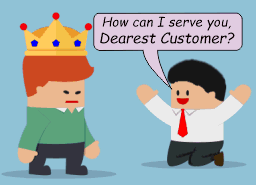
Both the democracies and
the free enterprise systems pander to the
people, and this encourages us to think about what we personally want,
rather than what is best for society. This encourages us to become
hypocritical, selfish, arrogant, spoiled brats. It encourages us to
boast about ourselves, make demands about what we want, and whine or
fight when we don't get what we want.
Some of us have enough self-control to avoid becoming brats, but it
would be better if our culture encouraged us to be team members rather
than focus on our personal desires. I predict that the future
generations will eventually switch to such an attitude, and that it
will have a dramatic effect on the
design of their cities, their economic system, their schools, their
holiday celebrations, and all of their other culture.
For example, instead of every person, business, sports group,
government agency, and other organization designing their homes, office
buildings, parking lots, and other structures in whatever style and
color that they please, and instead of letting every person and
organization put those structures at whatever location they please,
they will design their city according
to what is best for everybody.
If we
could travel into that distant future and live in their world for a few
years, I don't think we would want to come back to our era. I think we
would
regard the 21st century as having very crude and animal-like culture.
Why do I promote imaginary scenarios?
Nobody knows what the
cities will be
like thousands of years from now, or what their culture will be, so why
do I have so many predictions of what the future will be? Why do I have
so many images of what I think the cities should look like?
It is beneficial to speculate on
what the future will be because that can help us to realize what some
of our
options are. To rephrase this, when we allow our imagination to
speculate
about the distant future, we
sometimes give ourselves ideas about what we could do with our
future.
In order to improve our lives, we need to experiment with our options,
but what are our options? We are not
going to discover our options by
mimicking our ancestors. However, when we use
our imagination to guess at how people in the future will live, we can
get some ideas on what we might want to experiment with.
For example, will the future generations spend most of their leisure
time alone in their home, as millions of Americans are doing today?
Will the cities thousands of years from now be the same haphazard
jumbles
of ugly buildings, roads, and parking lots? Will the people a million
years from now have the same free enterprise system? Will the people
and businesses
spend their lives fighting one another for money, mansions, and private
jets?
I predict that there will be a point in the future at which humans
change their attitudes towards life and begin the process of improving
their culture. They will create cities that are truly
spectacular, and they will experiment with activities to
encourage people to get out of their
house and do something.
One technique to get people out of their house is to take advantage of
our desire to compete with one another. We could experiment with
contests, but not provide prizes in order to prevent people from
getting carried away with winning. For two examples:
|
1) By
arranging a "walking contest", we might encourage some people to
get together for a walk through the parks. Rather than compete to be
the fastest, the pressure would be to complete
the walk, and at the
rate the other people are walking, in order to get some exercise, and
to enjoy nature, the city, and the people.
|
|
2) We could arrange for some
automobile "races" with small electric vehicles that are slow,
comfortable, and reliable. The goal would be to complete an exploration
of a section of the city or a forest, or travel somewhere to fly drones
or have a picnic, rather than to be the fastest, or to perform
dangerous stunts.
|
|
 |
|

|
|
|
|
|
|
By
designing the foot paths and bicycle paths with different architectural
styles and vegetation, we would enjoy walking around in the city and
observing how the vegetation change through the seasons.
|
|
The
city could be designed with canals as part of a flood control system,
and to provide the people with calm water for rowboats, snorkeling,
scuba diving, swimming, and beautiful
scenery.
|
|

|
|

|
We need explorers, not conservatives or
liberals
We have much more food and
material wealth than the people of the
Middle Ages, but socially we have not
improved
by much. Actually, I suspect that some social problems are worse today,
such as crime, loneliness, homelessness, pedophile networks, and
monarchies.
The increasing number of divorces suggest that men and women are having
an increasingly difficult time forming pleasant relationships in this
modern world. Some feminists claim that divorce is increasing only
because it is now more practical for women to get a divorce, and that
wives were just as miserable centuries ago as they are today.
What is the truth about how human life has changed during the past few
thousand years? Were wives just as miserable when Archimedes was alive
as they are today? Were there just as many pedophile networks in
medieval Europe as they are today? Was there as many burglaries and
thefts in ancient Rome as there is in Italy today?
Unfortunately, social
science is still so crude that the field of "history" is still an
entertainment activity rather than a scientific analysis of the
past. This results in historians who don't care whether our history
books have inaccurate information and drawings of the first
Thanksgiving, and they don't even care if history books are lying about
the Apollo moon landing, the 9/11 attack, the Holocaust, or the world
wars.
We will never provide ourselves with accurate historical analyses, or
understand crime, divorce, selfishness, or other characteristics, or
improve our cities, economic system, recreational activities, or other
culture, until we are willing to make some major changes in our
attitudes towards life.
One of the changes we must make is to acknowledge that humans are a
species of monkey, but the majority of people oppose evolution. The
majority of people are either pushing religion on the social sciences,
or some variation of the philosophy that "human mind is a piece of
clay".
As a group, the conservatives are superior to the liberals, but they
should not be allowed in top
positions of leadership because they
inhibit progress.
The most obvious example are the conservatives in Asia who put pressure
on their nations to eat with prehistoric chopsticks, use prehistoric
rice farming techniques, and use a prehistoric written language.
Conservatives are also worthless as leaders because they beg
some god to solve problems rather than take an active role in
solving problems.
The
majority of people don't care about reality or evidence. They prefer to
believe whatever is most emotionally satisfying. As a result, they will
never provide us with an understanding of human
behavior, or the problems we experience. They will provide us with
unrealistic fantasies. Social science will never
become a productive science as long as they are allowed to dominate it.
We
need to restrict our top leadership to people who have the
personality of an explorer. Our
leaders should have the courage to face reality, discuss our options,
and experiment with our
culture.
We are not going to improve our world as long as we allow our nations
to be dominated by selfish, aggressive monkeys who want to grab all of
the bananas for themselves, and by pedophiles who want us to be their
servants and sex slaves. We need
better leadership.
|
